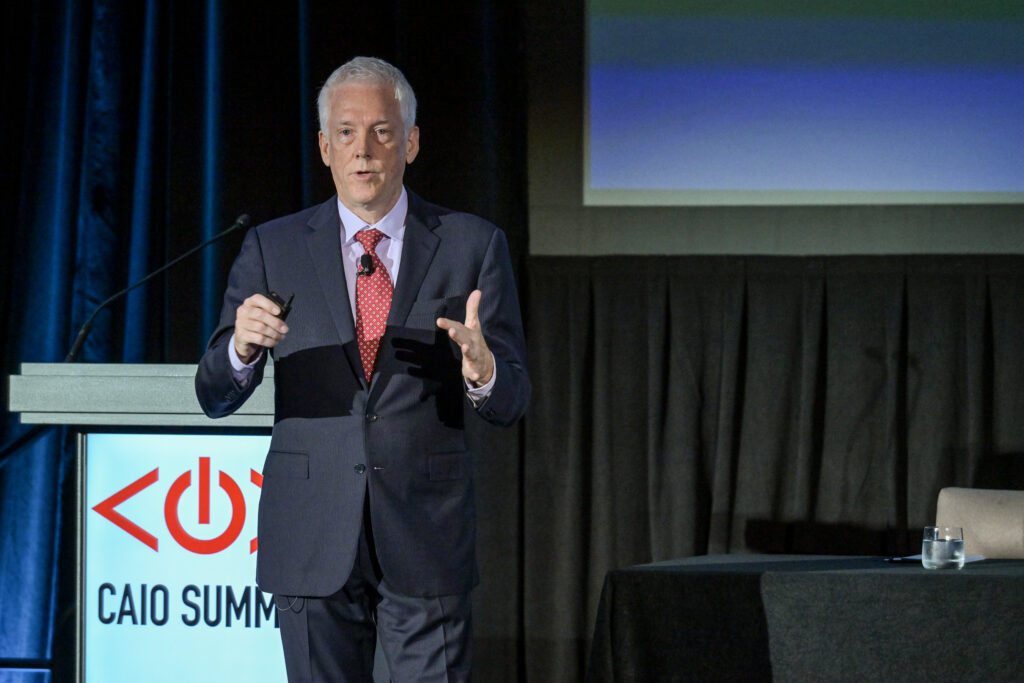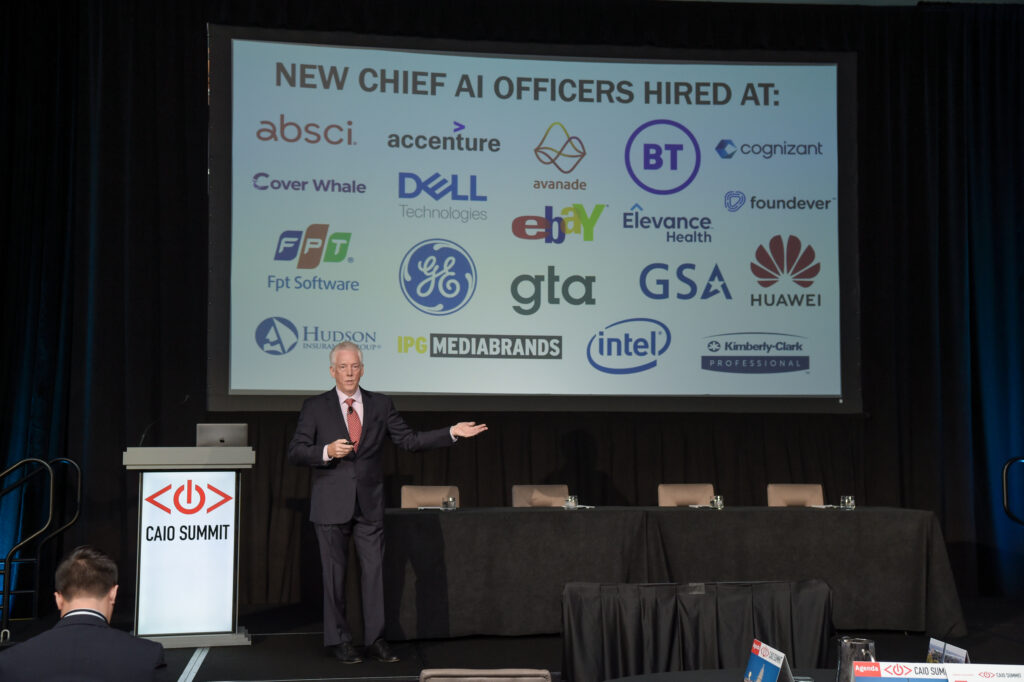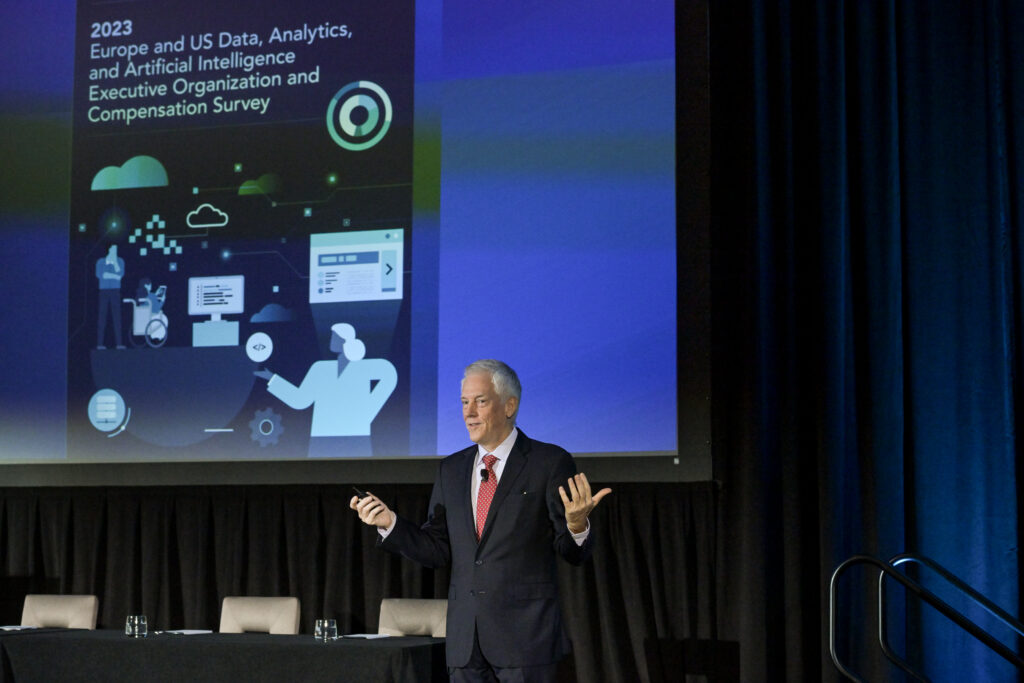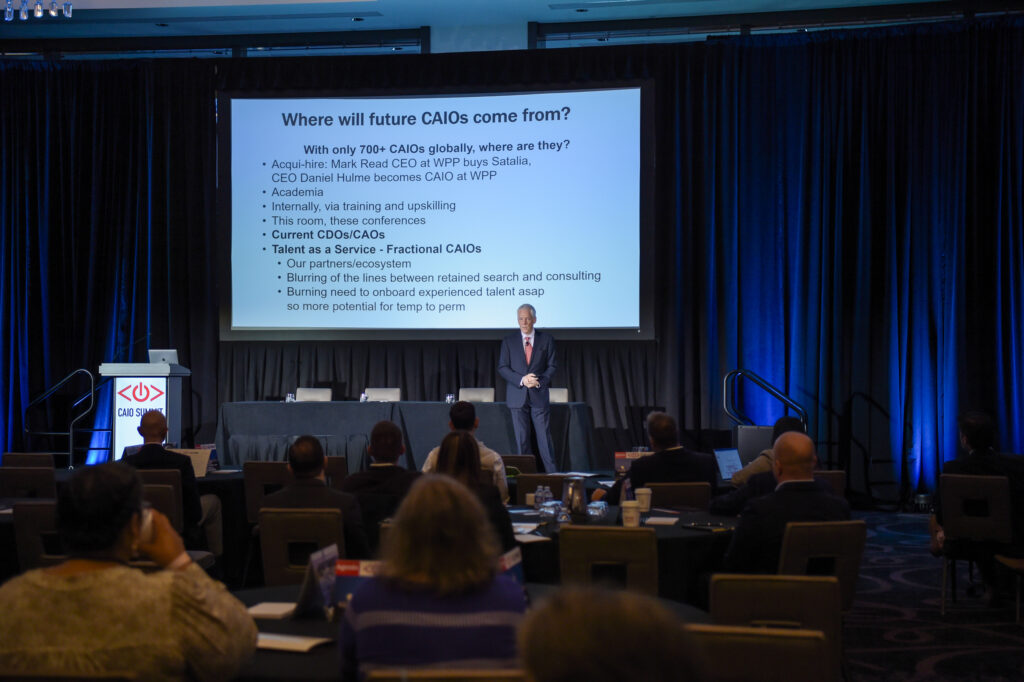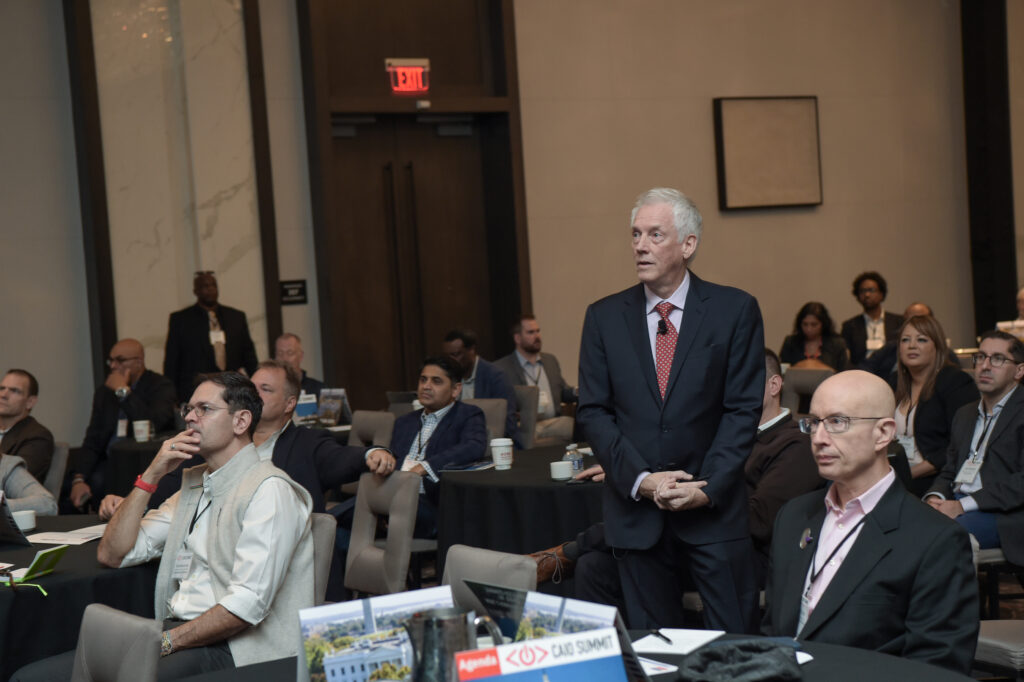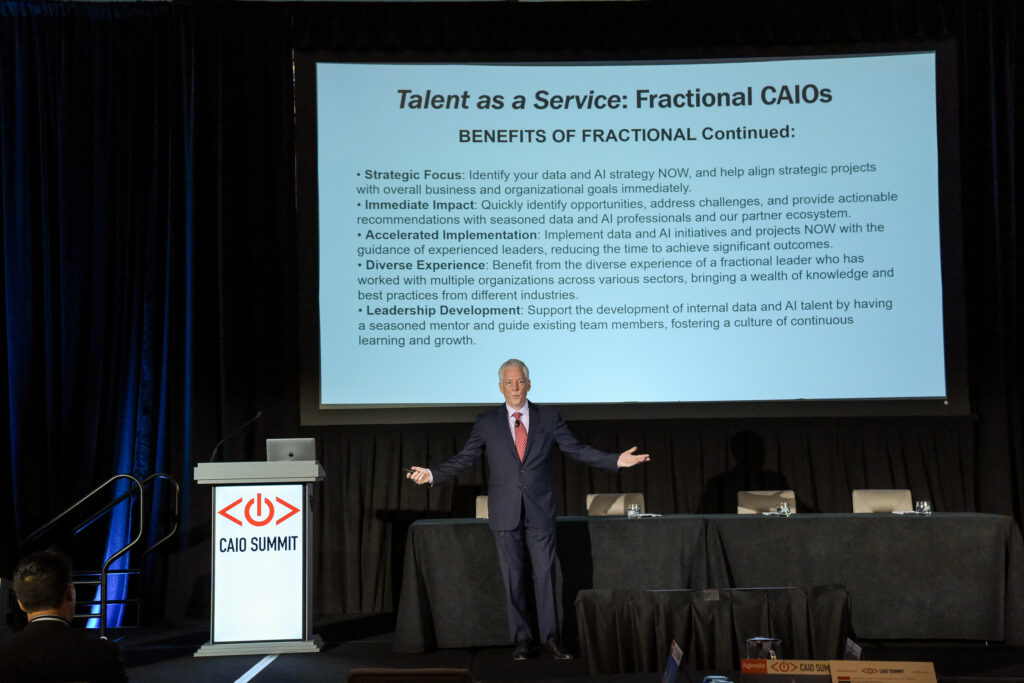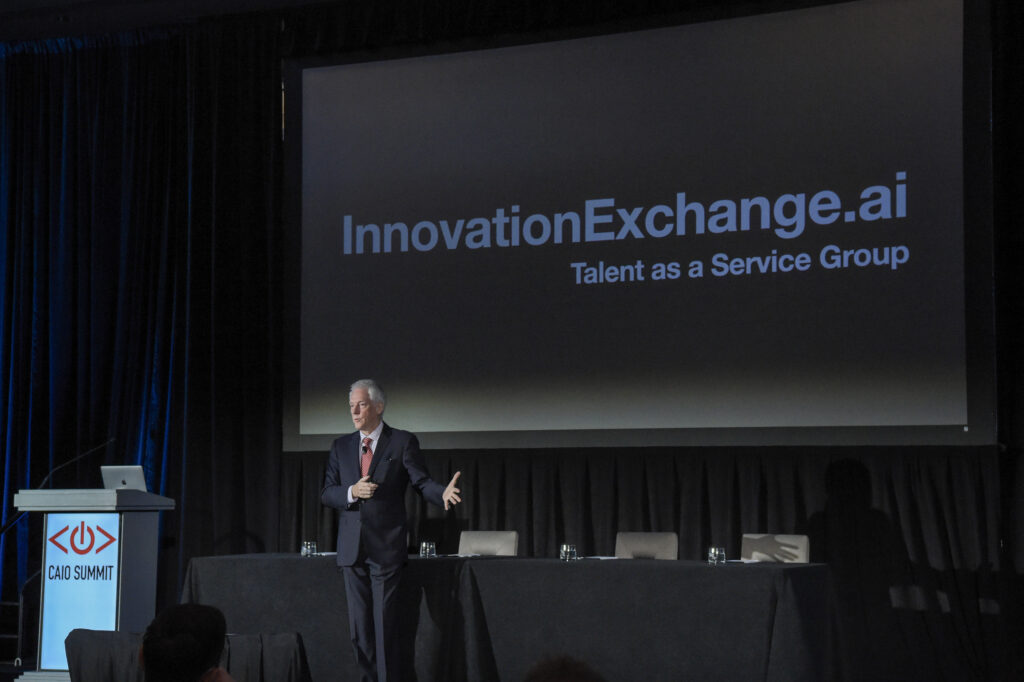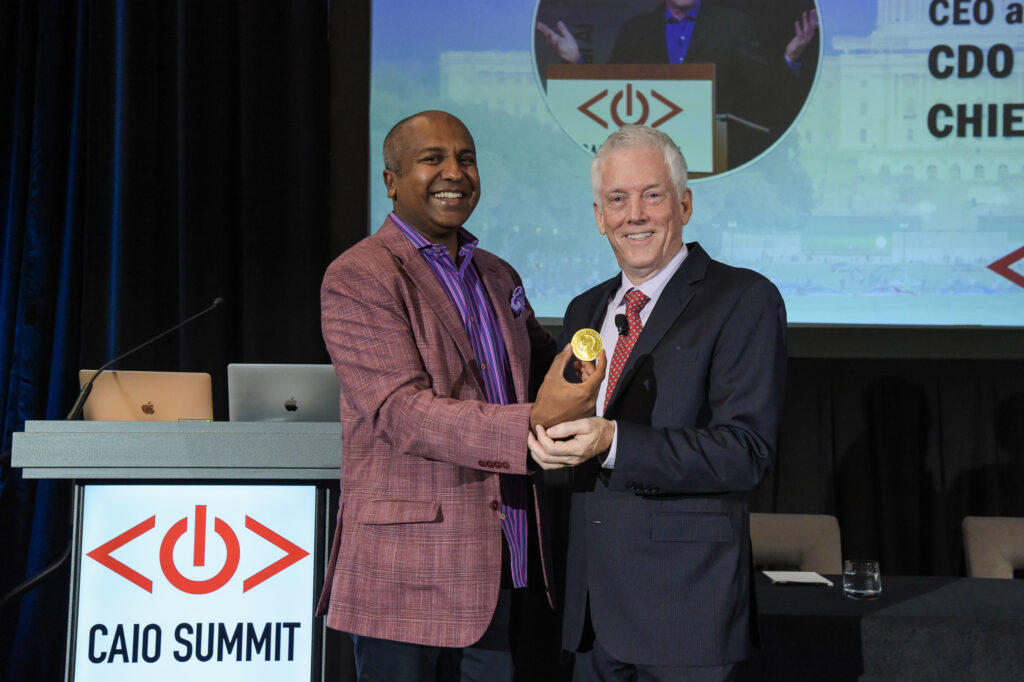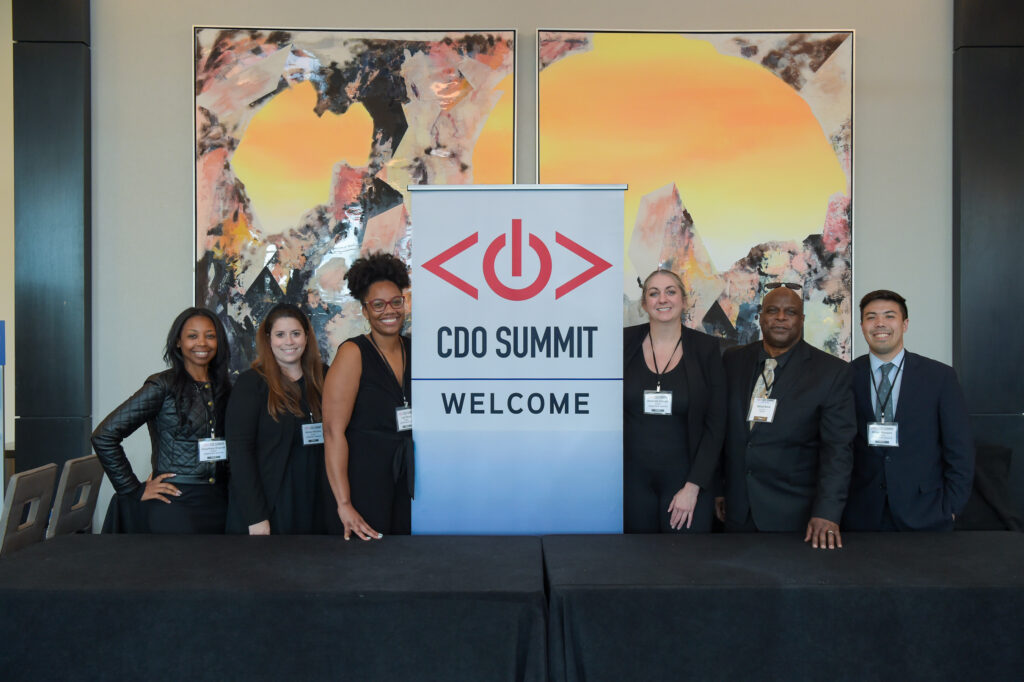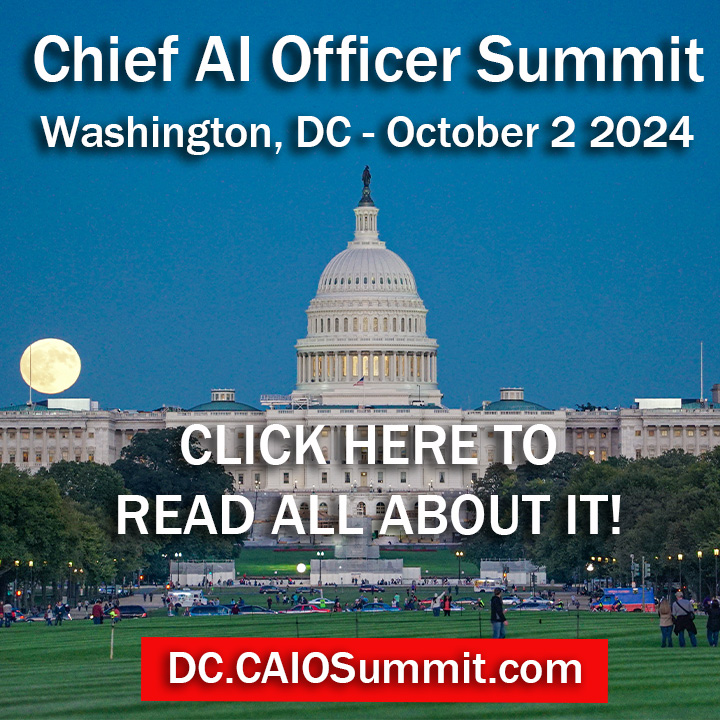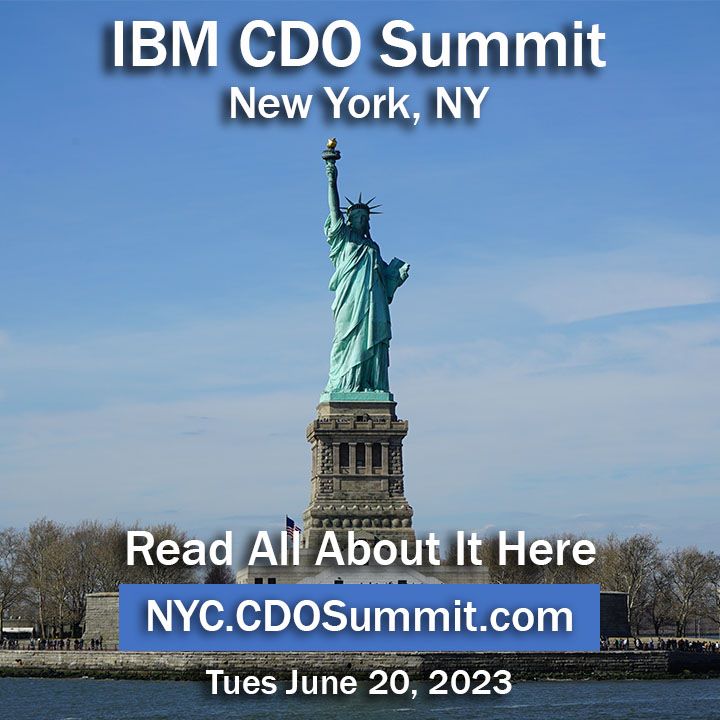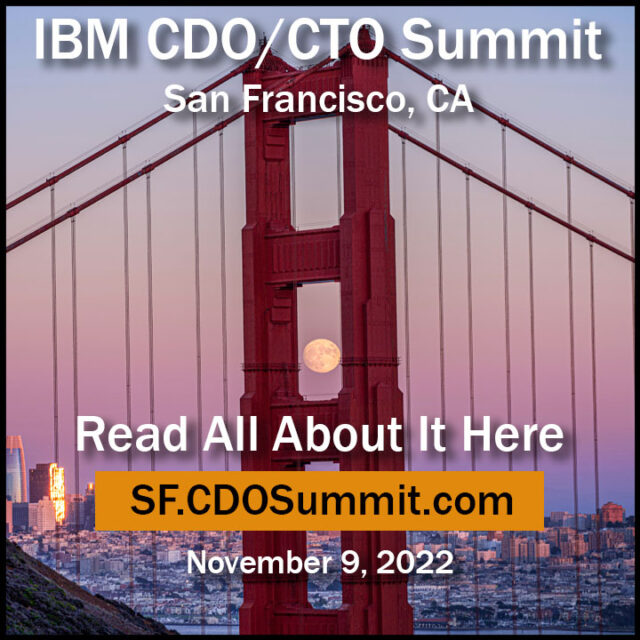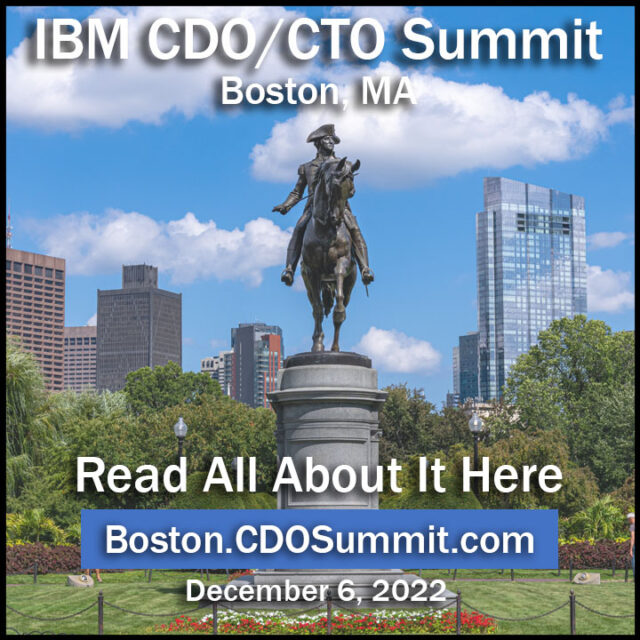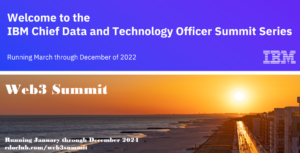Our third Chief AI Officer Summit was held on Wednesday, October 02, 2024.
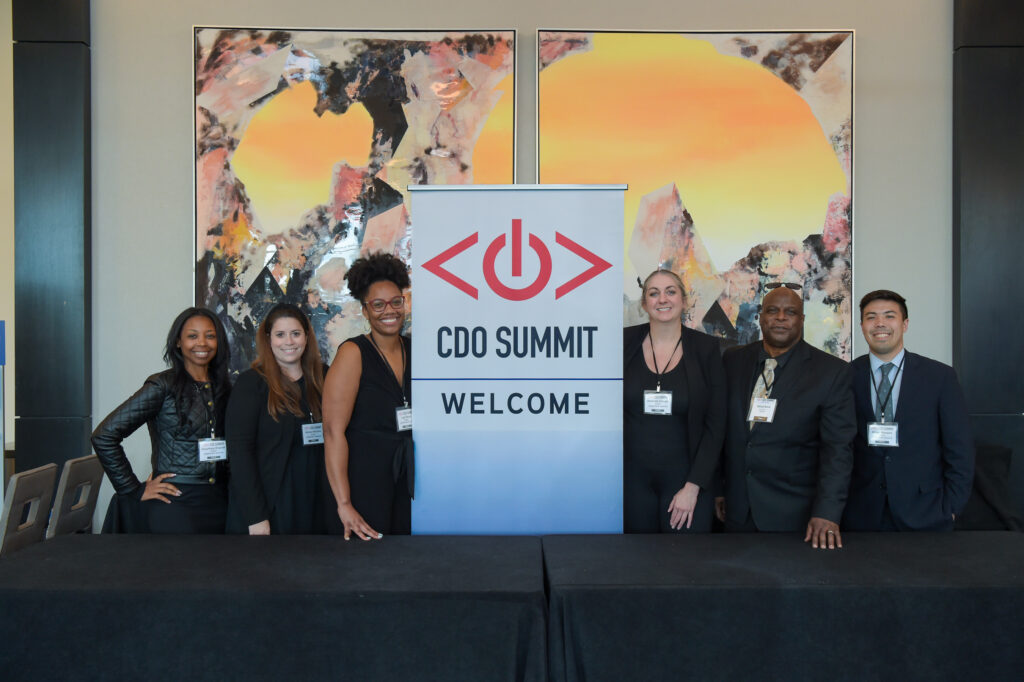 |
 |
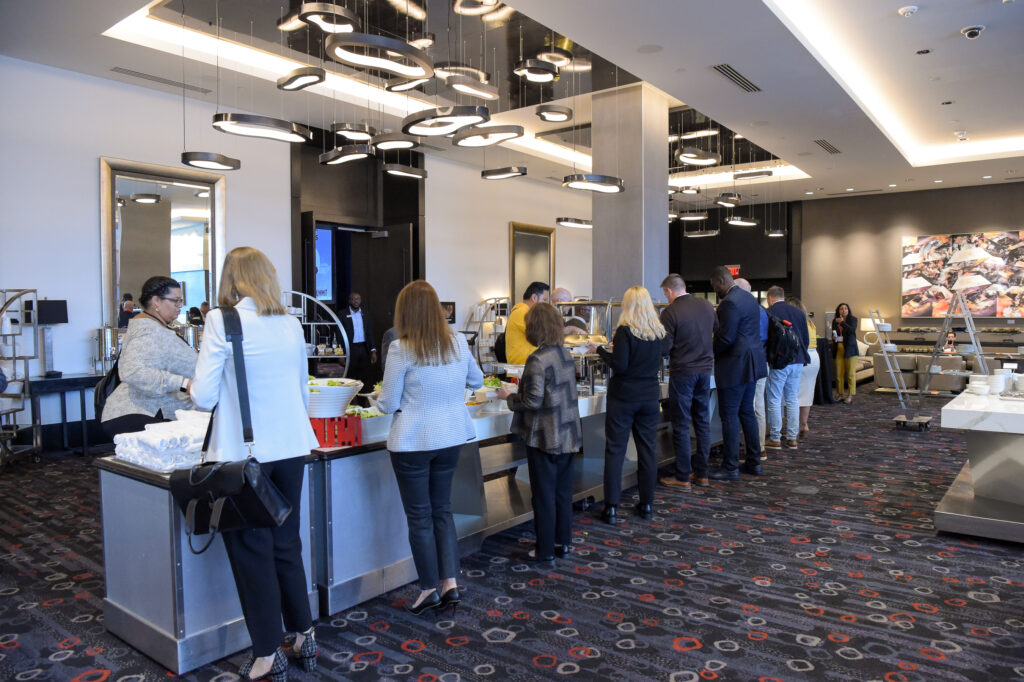 |
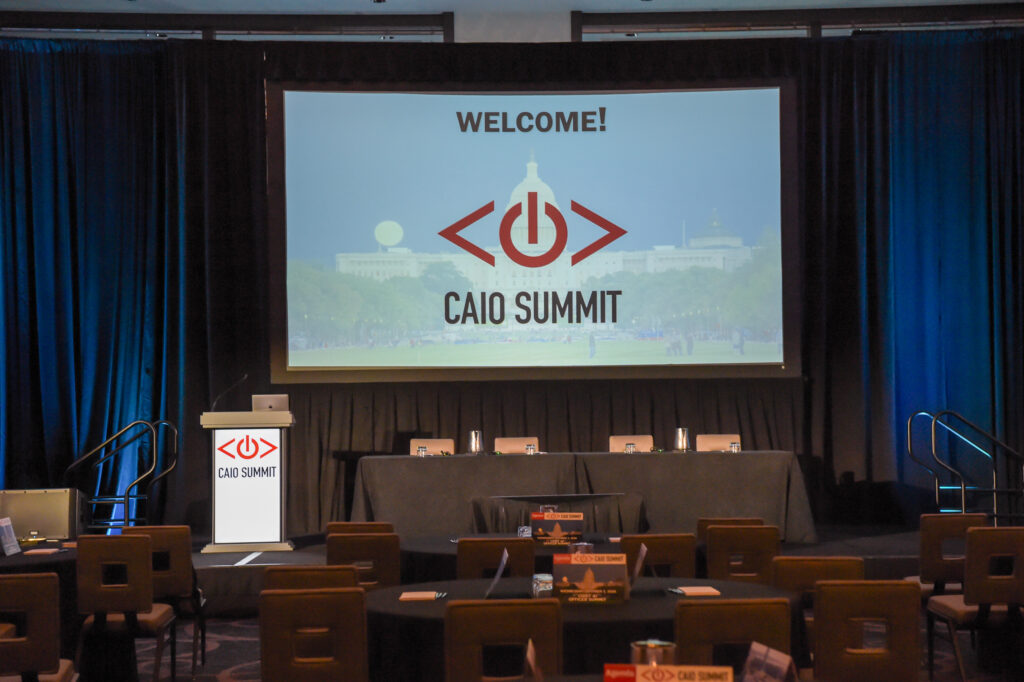 |
Delegates and speakers were welcomed by emcee Sree Sreenivasan, CEO at Digimentors and former CDO of NYC, the Metropolitan Musem of Art, and Columbia University.
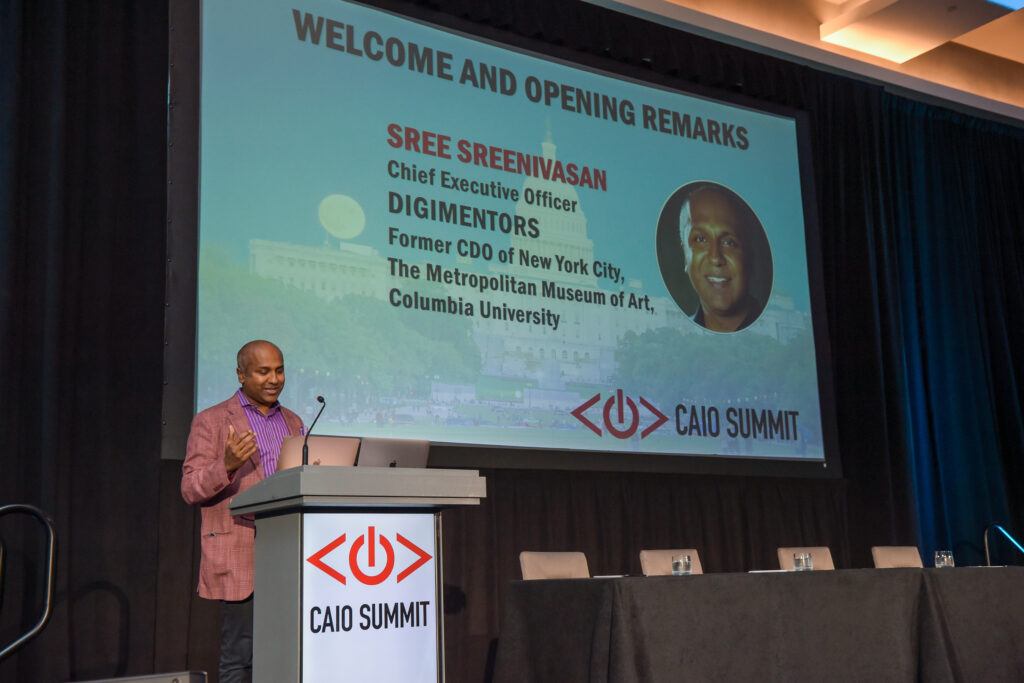 |
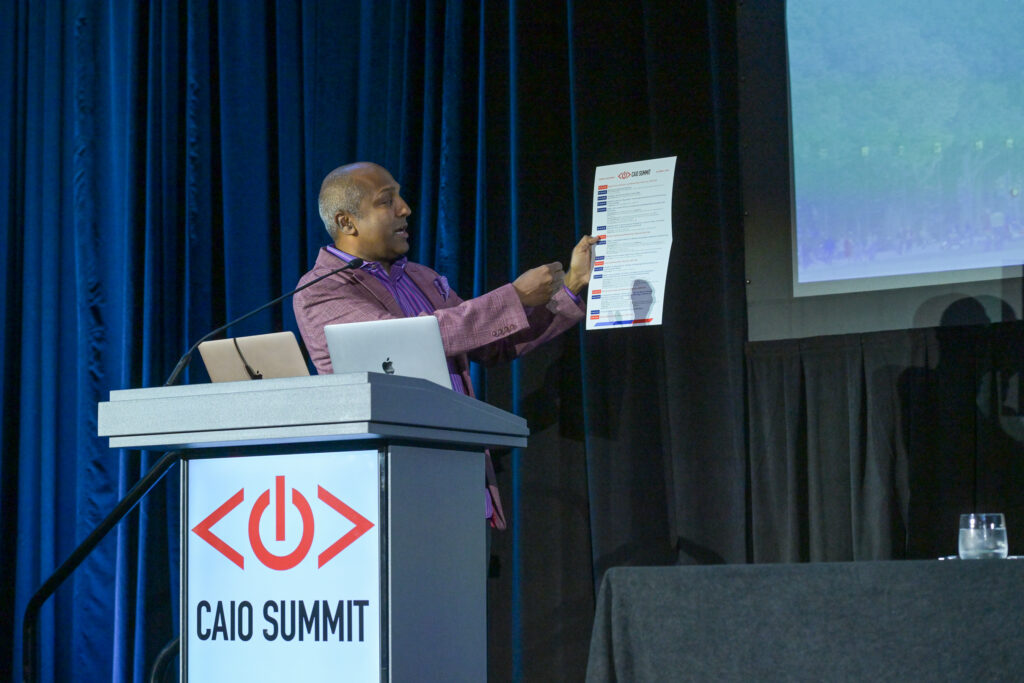 |
The opening keynote was delivered by David Mathison, CEO of the CDO Club and CDAO/CAIO Summit, on “The Chief AI Officer Talent Map 2024,” a groundbreaking effort to document and map the individuals leading AI strategies across industries and government.
This initiative highlights the rapid emergence of the CAIO role, showcasing how organizations are prioritizing artificial intelligence at the executive leadership level.
Mathison opened his presentation by highlighting a critical challenge: according to his analysis, there are only 700 fully qualified Chief AI Officers worldwide, while demand for AI leadership is skyrocketing.
This imbalance is driving up compensation, making it increasingly difficult for small and medium-sized businesses (SMBs), government agencies, and non-profits to compete for top AI talent.
WATCH THE FULL KEYNOTE VIDEO BELOW:
Mathison then shared his background, noting that in 2013 he produced the world’s first-ever Chief Digital Officer Summit and published the world’s first Chief Digital Officer Talent Map, pioneering efforts to highlight emerging executive roles in digital transformation.
In 2014, Mathison began tracking Chief Data and Analytics Officers as these roles gained prominence.
By 2020, Mathison turned his focus to Chief AI Officers (CAIOs) while producing a series of webinars for IBM’s Office of the Global Chief Data Officer, led by Inderpal Bhandari, and the IBM AI Client Accelerator team.
The growth of CAIOs has been remarkable:
- 2020: 250 CAIOs identified (tracking began for IBM webinars)
- 2021: 400 CAIOs
- 2022: 500 CAIOs (CAIOs doubled in two years)
- 2023: 600 CAIOs (coinciding with our world’s first CAIO Summit in Boston)
- Jan 2024: 781 CAIOs
- Oct 2024: 1,400 CAIOs (our 3rd CAIO Summit; CAIOs doubled in under one year)
This growth underscores the rising demand for AI leadership across industries and sectors.
Notably, 2024 marked a key milestone, with the number of CAIOs surpassing 1,000 — a tipping point that mirrors the trajectory of Chief Digital Officers (CDOs) and Chief Data Officers (CDOs) before them.
Once these roles hit the 1,000-person mark, their growth accelerated rapidly, signaling the mainstream adoption of AI leadership as a critical priority for organizations worldwide.
He then highlighted how the top sectors and companies hiring Chief AI Officers (CAIOs) have shifted over the past year.
The U.S. government surged to the top position, driven by the Biden-Harris 2023 Executive Order on AI, which mandated that all U.S. federal agencies appoint Chief AI Officers.
The current top sectors hiring CAIOs are:
- Government (surging from virtually zero to the top of the list, driven by the Biden-Harris Executive Order on AI in 2023)
- Technology
- Financial Services
- Insurance
- Medical
This mirrors the trajectory of Chief Data Officers a decade earlier, when federal mandates jump-started the adoption of that role.
Similarly, the government’s push has accelerated hiring in this emerging and critical field, further solidifying the role of CAIOs as essential to organizational strategy and innovation.
He then showcased the LinkedIn profiles and backgrounds of several leading Chief AI Officers, highlighting the diversity and global nature of the role. These leaders include:
- Ambica Rajagopal: CAIO at Michelin (India/France)
- Daniel Hulme: CAIO at WPP (England)
- Deepika Adusumilli: CAIO at BT (England)
- Wole Moses: CAIO at Microsoft
- Accenture’s Arnab Chakraborty, Lan Guan, and Denise Zheng
Their varied experiences across industries and geographies underscore the critical importance of AI leadership at both global enterprises and regional organizations.
Most importantly, for this event in Washington, D.C., Mathison explored the 60 Chief AI Officers hired across federal agencies, and other CAIOs at the U.S. Armed Services, and U.S. Government, emphasizing the growing influence of AI leadership within the public sector.
He highlighted the broad spectrum of speakers who shared their expertise at the summit, including:
- Brian Peretti: Chief Technology Officer and Deputy Chief AI Officer, U.S. Department of the Treasury
- Chris Kraft: Deputy CTO, AI/Emerging Technology, U.S. Department of Homeland Security
- Dr. Mike Horton: Chief AI Officer (Acting) and Deputy Chief Data Officer, U.S. Department of Transportation (DOT)
- Eileen Vidrine: Former Chief Data & Artificial Intelligence Officer, U.S. Department of the Air Force
- Michael Boyce: Director, DHS AI Corps, U.S. Department of Homeland Security
- Olivia Zhu: Assistant Director for AI Policy, The White House
- Randal Cole: Chief Data and AI Officer (Acting), U.S. Department of the Navy
- Stephanie Hunter: Deputy Director, Defense Digital Talent Management, Development and Training, Chief Digital and Artificial Intelligence Office, U.S. Department of Defense
- Vinay Vijay Singh: Chief AI Officer, U.S. Department of Housing and Urban Development (HUD)
Their participation underscores the U.S. government’s commitment to embedding AI leadership at the highest levels to drive innovation, security, and efficiency across agencies and departments.
In June 2024, Dubai underscored the global significance of this trend by announcing the appointment of Chief AI Officers (CAIOs) across 22 government agencies.
This move not only highlights the worldwide adoption of AI leadership but also intensifies the strain on the already limited talent pool required to meet the growing demand for this critical role.
Mathison then addressed remuneration for Chief AI Officers.
According to his research—validated by the annual CDAO/CAIO Compensation Reports from Ryan Bulkoski at executive search firm Heidrick & Struggles — compensation for seasoned AI professionals in highly paid industries such as financial services ranges from $600,000 to $1.3 million annually.
This high level of compensation creates a significant challenge for government agencies, small and medium-sized businesses (SMBs), and non-profits, effectively pricing them out of the market for top AI talent.
NOTE: compensation varies by industry sector, company/org, and candidate qualifications.
He then explored where Chief AI Officers (CAIOs) are coming from, given their scarcity—just over 700 globally. So, where can you find them?
- Acqui-hire: Companies acquire AI-driven organizations and elevate their leaders. For example, Mark Read, CEO of WPP, acquired Satalia, leading to its CEO, Daniel Hulme, becoming WPP’s CAIO.
- Internal Training & Upskilling: Organizations promote talent from within by investing in AI-focused skills development.
- Academia: Universities and research institutions serve as a strong talent pool for emerging CAIOs.
- Conferences & Events: Industry events, like the Chief AI Officer Summit, are increasingly becoming key places to identify and recruit AI leadership.
- Current Chief Data Officers (CDAOs): Many CAIOs transition from existing Chief Data and Analytics Officer roles as organizations evolve their focus to AI.
- “Talent as a Service” – Fractional CAIOs: For organizations unable to secure full-time AI leadership, fractional or part-time CAIOs provide the expertise needed to develop and execute AI strategies.
Since this was a two-day event for Chief Data Officers (CDOs), Chief Data and Analytics Officers (CDAOs), and Chief AI Officers (CAIOs), Mathison then ventured into the audience “Phil Donahue-style” to leverage the wisdom of the crowd and discuss why CDOs and CDAOs are ideally positioned to become CAIOs, highlighting their proven strengths and experiences:
- Innovation and Disruption: The greatest innovation now stems from the data side, where CDOs/CDAOs have already driven transformation.
- Battle-Tested Leadership: CDOs/CDAOs successfully led through the global pandemic, ensuring business continuity, efficiency, and resilience.
- Delivering Under Pressure: From enabling remote learning, telemedicine, and last-mile delivery to optimizing workflows during work-from-home (WFH), these leaders proved their value under immense stress.
- Regulatory Expertise: They have navigated complex regulations, including GDPR, CCPA, PII management, and explainability—critical skills for ethical AI leadership.
- Data as the Foundation of AI: Large Language Models (LLMs) and Generative AI depend on data. CDOs/CDAOs bring expertise in machine learning (ML), deep learning (DL), and computer science (CS).
- Scholarly and Collegial: Known as the most collegial group in the C-suite, CDOs/CDAOs boast:
- More PhDs per capita than any other C-suite leadership title.
- Experience mentoring and collaborating on academic research and dissertations.
- A voracious appetite for continual learning and insatiable curiosity for numbers, analytics, and innovation.
- From Defense to Offense: CDOs and CDAOs have shifted from playing defense (compliance and governance) to offense (innovation and growth).
- Data Literacy to AI Literacy: After championing data literacy across their organizations, the natural next step is to drive AI literacy as a CAIO.
- Expanding Their Role: Just as they embraced the hybrid “Analytics” responsibilities in the CDAO title, they are well-suited to take on AI responsibilities and leadership.
Mathison then explained why ‘traditional’ executive search for the Chief AI Officer (CAIO) title is fundamentally broken, highlighting the unique hiring challenges organizations face in securing top AI leadership:
- Sky-High Compensation: The demand for elite AI talent has driven compensation to unsustainable levels, pricing out SMBs, federal agencies, and non-profits from competing for the best candidates.
- Prolonged Search Timelines: Traditional executive search processes can take up to one year. In such a dynamic field:
- Candidates you interview in month 1 will likely accept another offer before you reach months 9-12 (the offer stage).
- This delay is untenable for organizations that need AI leadership to deliver on fast-moving priorities.
- Skills Obsolescence: AI talent “skills out” quickly. The skillsets needed at the beginning of the search may become irrelevant by the time an offer is made, given the rapid evolution of AI technologies.
- Uncertain Outcomes: Even after a lengthy search, there’s no guarantee of success — candidates often jump roles, creating instability in leadership.
- Undefined Job Descriptions: Who writes the CAIO job description? Many organizations struggle to define the role and expectations without an existing AI strategy in place.
- Rapidly Moving Goalposts: Exponential technologies like Generative AI progress so quickly that by the time a candidate is hired, the AI priorities and requirements may have shifted entirely.
- Interviewing Dilemma: Assessing a CAIO requires specialized knowledge. Ironically, you need a CAIO to effectively interview and evaluate CAIO candidates.
- Undefined Strategy: Many organizations lack a clear AI strategy. Can they afford to wait another year to define this before making a key hire?
Mathison underscored the urgent need for organizations to rethink traditional hiring practices to address these challenges, ensuring they can attract and retain the AI leadership needed to drive innovation and success.
Mathison outlined the advantages of fractional Chief Data and AI Officers (CDAO/CAIOs) as a flexible, cost-effective, and impactful alternative to traditional executive search:
- Flexibility and Scalability: Engage fractional talent on an as-needed, pay-as-you-go basis, providing scalable leadership that adapts to your organization’s evolving goals and projects without long-term commitment.
- Cost-Effective Expertise: Gain access to top-tier data and AI leadership without the financial burden of a full-time executive—ideal for SMBs, government agencies, and non-profits priced out of traditional hiring.
- Immediate Impact: Fractional leaders deliver results now — quickly identifying opportunities, addressing challenges, and accelerating implementation of AI and data initiatives to achieve measurable outcomes.
- Specialized Skills On-Demand: Access a global talent pool with specialized AI and data expertise that may not exist in-house, enabling your organization to tackle complex, mission-critical challenges efficiently.
- Strategic Focus: Fractional CAIOs help define and align AI strategy immediately, ensuring projects are prioritized and linked to overarching business goals.
- Reduced Risk: Mitigate hiring risks like misalignment or underperformance by engaging a fractional executive to “try before you buy,” or “hot swap” talent as needs evolve.
- Diverse Experience and Innovation: Benefit from leaders who have worked across multiple organizations and industries, bringing cutting-edge knowledge, fresh perspectives, and best practices to drive innovation.
- Leadership Development: Fractional executives act as mentors, upskilling internal talent, fostering a culture of continuous learning, and complementing—not replacing—existing teams.
- Agile and Non-Disruptive: A nimble, low-risk solution that seamlessly integrates with current operations, amplifies team capabilities, and delivers results without threatening existing roles or workflows.
To close, Mathison announced the upcoming launch of his new company, InnovationExchange.AI, which will offer fractional “Talent as a Service“ for organizations seeking part-time Chief AI Officers (CAIOs) and Chief Data and Analytics Officers (CDAOs).
Leveraging the strength of his CDO Club community of 100,000 members, the platform aims to solve critical AI talent challenges by connecting companies with experienced leaders and a robust peer network.
InnovationExchange.AI will provide a comprehensive suite of services, including:
- Expert Reviews and Assessments
- Workshops and Training
- Executive Coaching
- Advisory Services
- Fractional Executives
By collaborating with this unparalleled peer community, organizations can access top-tier leadership, tailored expertise, and innovative solutions to drive AI success.
InnovationExchange.AI is set to officially launch in Q4 2025, marking a major milestone in helping companies bridge the AI talent gap efficiently and effectively.
By shining a light on the individuals driving AI transformation, we hope to inspire future leaders, promote collaboration, and help organizations harness AI’s full potential responsibly and strategically.
Finally, a special thanks to Sree Sreenivasan for emceeing the CDAO and CAIO Summits.
Sree’s history with our events reflects the incredible power of connections made at these gatherings:
- At our inaugural 2013 CDO Summit in NYC, Sree met the hiring manager for the Metropolitan Museum of Art, which led to his appointment as their Chief Digital Officer.
- At our 2014 Summit, Sree connected with Magnus Gylje, then Chief Digital Officer at Nobel Media—a relationship that later saw Sree host the prestigious Nobel Peace Prize Conference in Oslo, Norway. Coincidentally, he had just returned from Oslo the night before our CAIO Summit.
These milestones highlight how events like ours continue to create transformative opportunities for leaders worldwide.
In his introduction of Mathison’s keynote, Sree recalled the late, great Phil Donahue’s endorsement of David’s book, Be The Media, which inspired Mathison to venture into the audience to leverage the wisdom of the crowd, Donahue-style.
After Mathison’s session, Sree presented him with an honorary (chocolate) Nobel Peace Prize—a gesture to cherish forever!
You simply won’t find a kinder, more humble servant leader, dedicated to collaboration and inclusion. We all are truly grateful to have Sree in our lives.
The next keynote was on “Small AI, Big Impact: Unlocking the Promise of AI with the Power of Small Models,” with Yudong Cao, CTO at Zapata AI.
In this keynote, Yudong challenged the prevailing focus on large language models (LLMs) as the ultimate AI solution.
Instead, he explored the untapped potential of “small AI” —specialized models that offer significant value by addressing specific enterprise challenges.
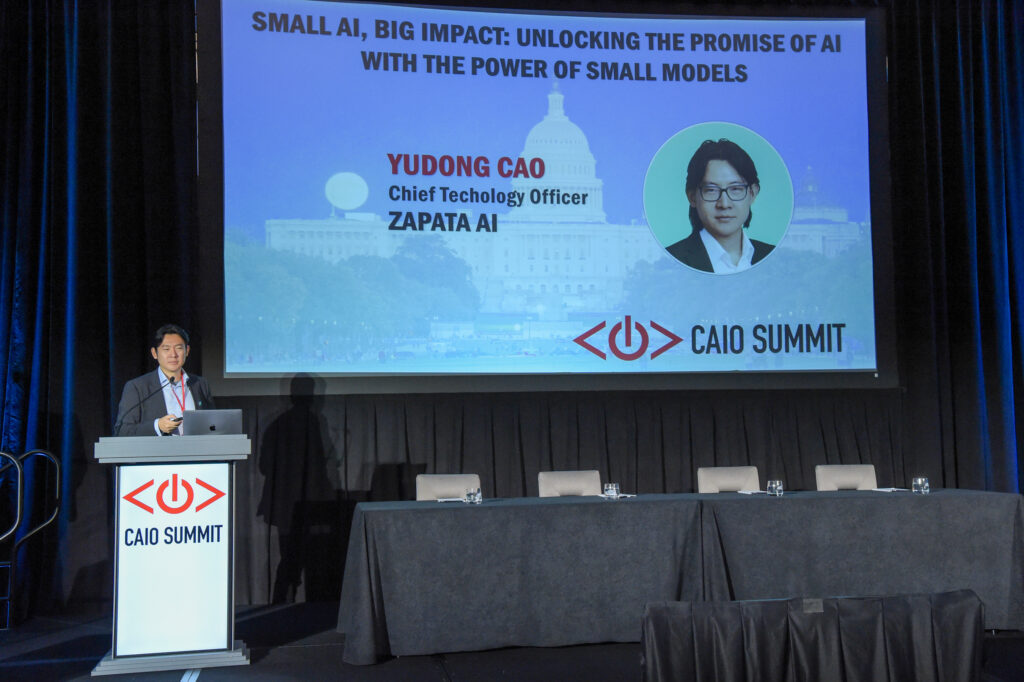 |
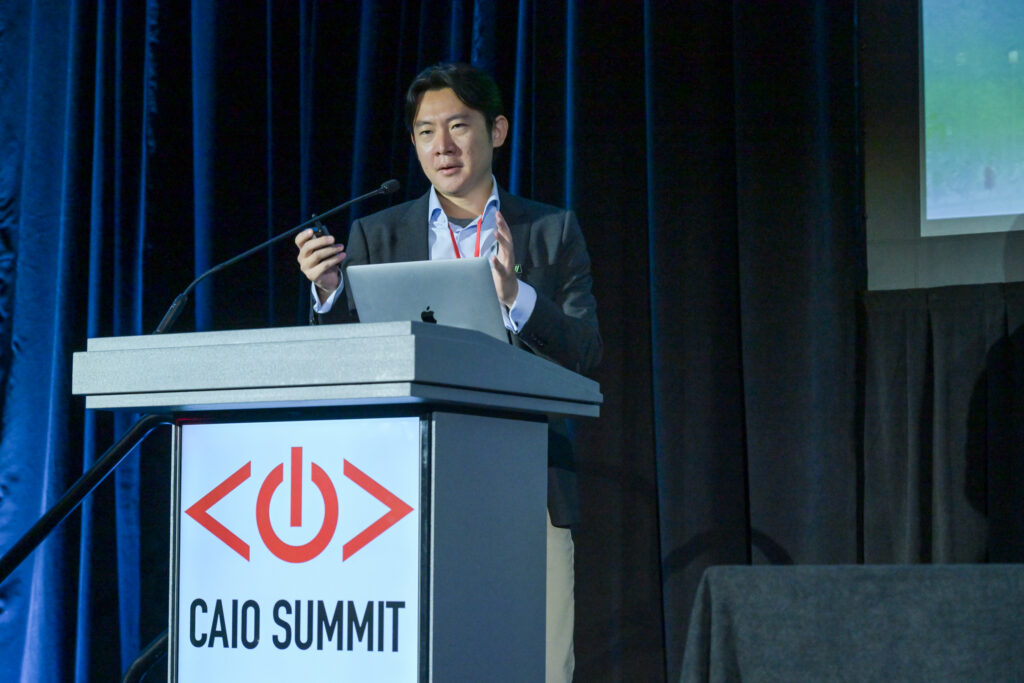 |
Yudong explained how deploying smaller models closer to the edge can overcome barriers like compute accessibility, data privacy, and resource constraints, ultimately leading to more efficient and secure AI implementations.
The first panel of the day was on “AI for Good: Ethical AI Leadership and Responsible Innovation and Governance” was moderated by David Mathison, CEO of the CDO Club and CDAO/CAIO Summit.
With artificial intelligence, it’s not just about what we achieve but how we achieve it.
Thoughtful, ethical leadership and responsible innovation and governance are keys to ensuring that these technologies serve the greater good.
This panel featured AI experts from some of the nation’s most influential government agencies, all united by a mission to use AI ethically, responsibly, and for the betterment of society.
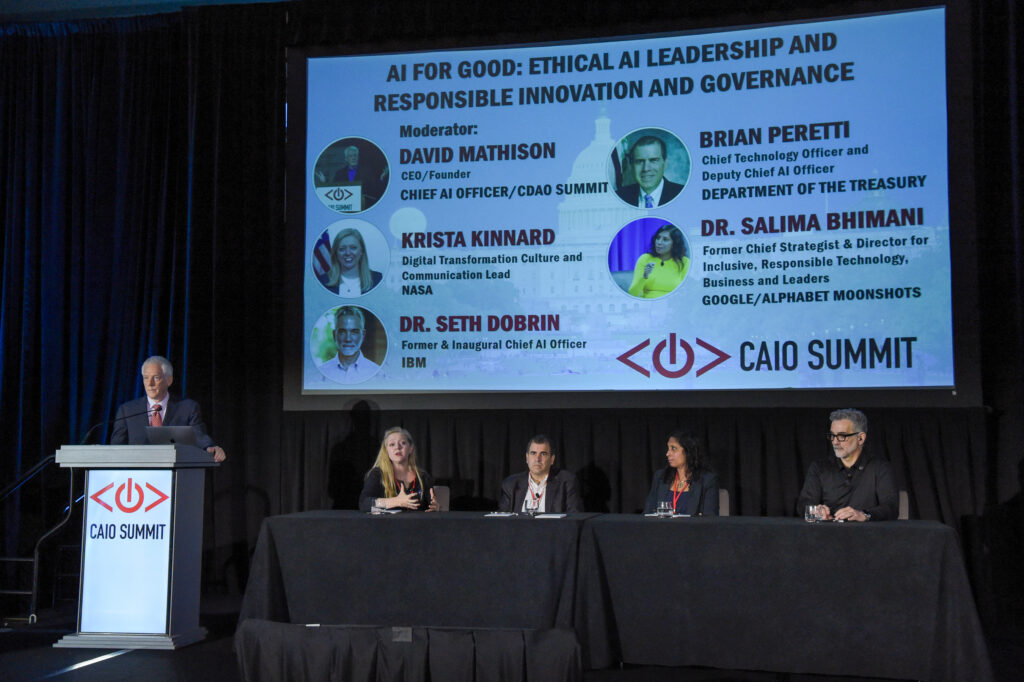 |
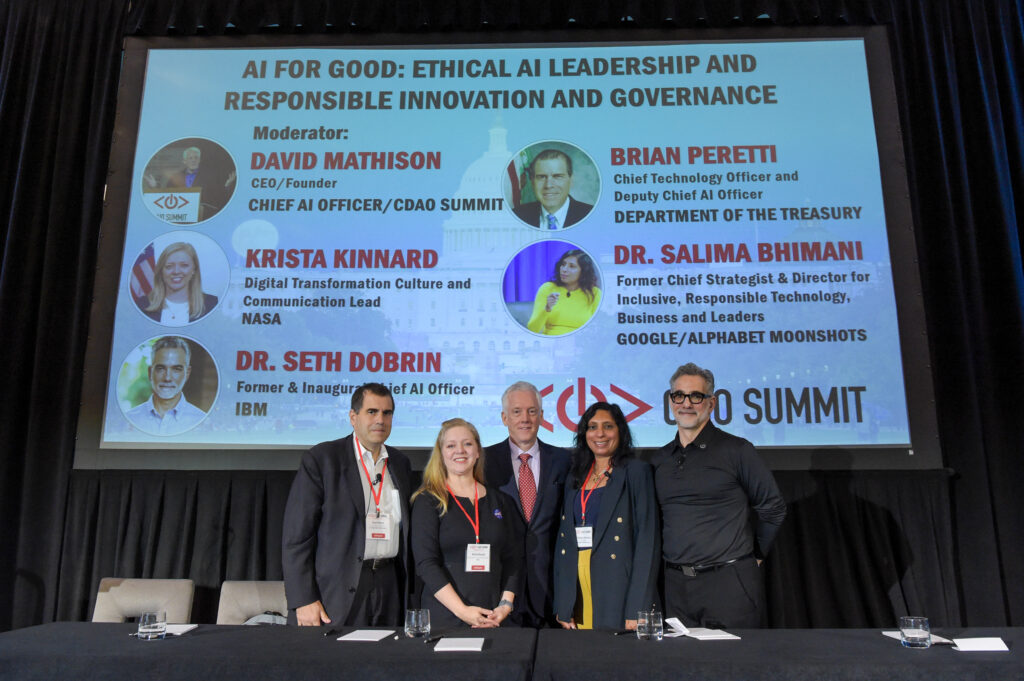 |
Panelists shared their previous accomplishments, current initiatives, future goals and challenges, and the resources and talent they’ll need to continue driving AI forward while upholding the highest standards of responsibility, equity, and inclusivity.
Drawing inspiration from NASA’s mission to innovate to help humanity and Google/Alphabet Moonshots’ goal of creating systems that serve diverse communities, the discussion focused on how AI leaders are pushing the boundaries of what’s possible while ensuring that their work benefits society and a wider range of people.
Panelists included:
- David Mathison: CEO, CDAO/CAIO Summit (moderator)
- Brian Peretti: Chief Technology Officer and Deputy Chief AI Officer, U.S. Department of the Treasury
- Krista Kinnard: Digital Transformation Culture and Communication Lead, NASA
- Dr. Salima Bhimani: Former Chief Strategist & Director for Inclusive, Responsible Technology, Business and Leaders, Google
- Dr. Seth Dobrin: Former Chief AI Officer at IBM
<VIDEO COMING SOON>
We are now planning our next events.
Contact us for more information: info at CDOClub.com
Next up was a Fireside Chat with the U.S. Navy and Domino Data Lab on “Transformational AI Adoption in the U.S. Navy” featuring:
• Nick Elprin: CEO, Domino Data Lab
• Randal Cole: Chief Data and AI Officer (Acting), Department of the Navy Office of the CIO (OCIO)
As AI in all its forms, from analytics to machine learning and Generative AI, is increasingly ready for mission-critical use cases, there’s a lot on the line.
The potential to transform organizations and find new ways to accomplish missions with AI is proven, but agencies still face hurdles to scaling AI.
At this session, delegates learned:
• Perspective from the U.S. Navy’s Chief Data and AI Officer on adopting AI to achieve mission critical outcomes.
• What agencies should know about AI risks.
• The toolsets and processes organizations need to sustainably create value from AI while mitigating risks.
• Actionable next steps to integrate AI rapidly, safely, and cost effectively.
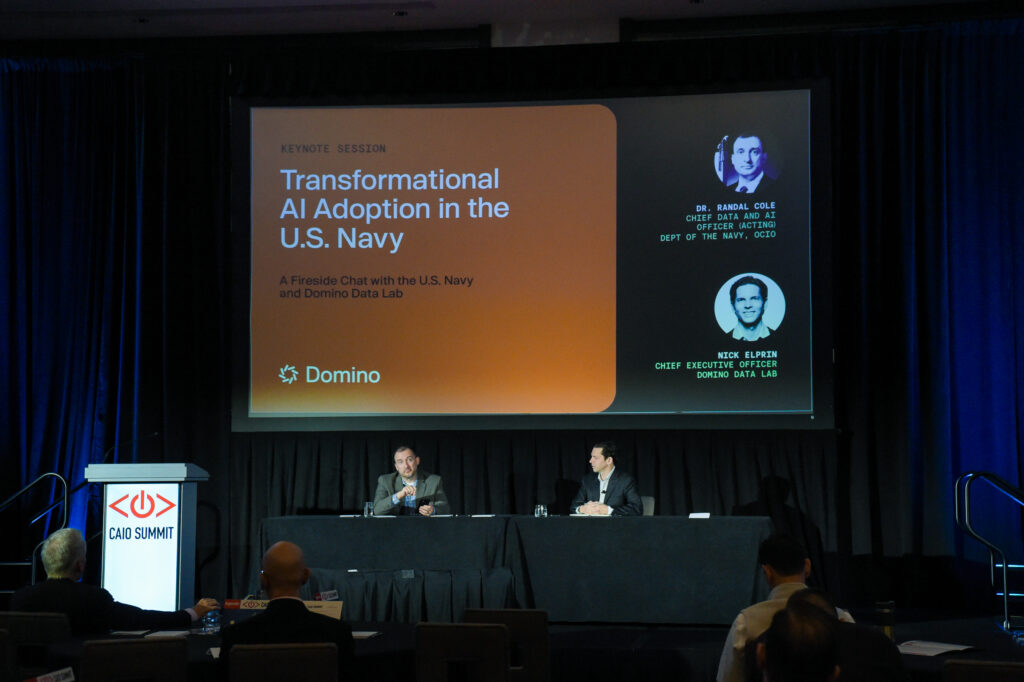 |
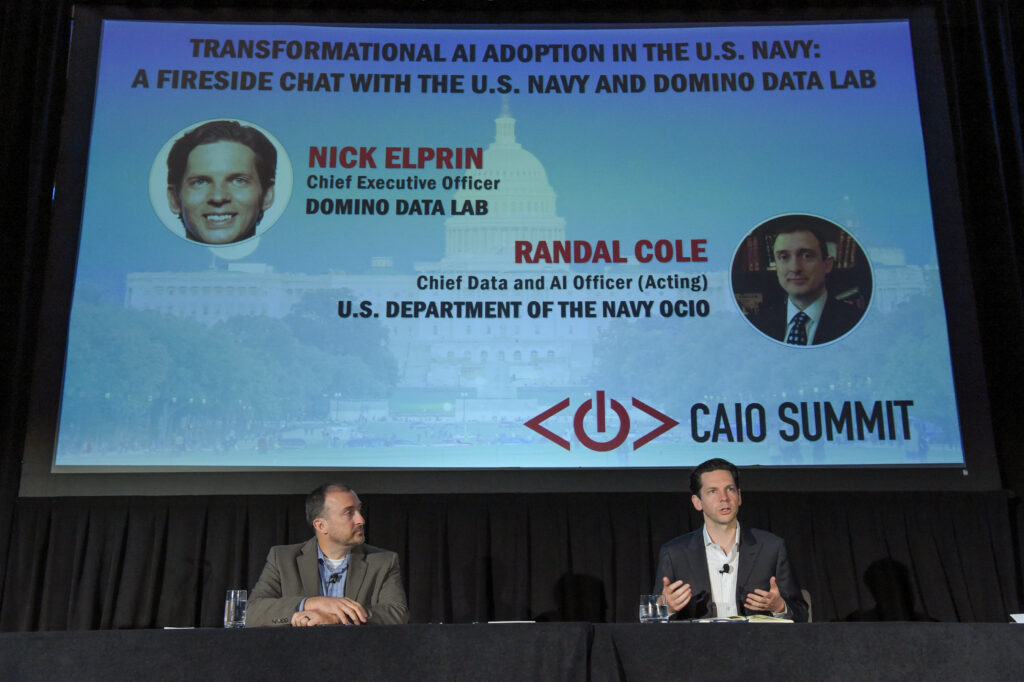 |
See the full video above. My top five moments from this session included:
01:00: Nick’s introduction to Domino Data Lab: “We spent the last decade building the best platform to enable large organizations to build and operate AI at scale, especially in mission critical use cases. Domino works with 10 of the largest pharmaceutical companies, large banks for credit risk monitoring, and in the public sector I am proud of our work with the Federal Reserve, Centers for Disease Control, General Accounting Office, Department of Defense, and the US Navy, among others.”
07:45: When Randall discusses the hundreds of AI use cases at the US Navy Office of the CIO, including text analytics, natural language processing, and machine learning to help parse and curate the Navy’s message traffic.
10:20: The AMMO use case – “With Domino, the U.S. Navy’s AMMO team was able to decouple hardware and software updates to dramatically accelerate updates to ATR models at the edge. This results in more accurate imagery and sonar-based intelligence that can be trusted and actioned by naval decision-makers for next-generation warfare advantage.”
27:00: “We are up against enemies who may not care about ethics and responsible AI.” “Enemies don’t play by the rules.”
33:00: During the audience Q&A, there were some great questions from John Larson, Executive Vice President of AI at Booz Allen Hamilton who asked about the edge and compression of algorithms, and a question from Seth Dobrin who was the inaugural CDO at Monsanto and the inaugural Chief AI Officer at IBM.
Thanks to all for a great session!
For more information, visit Domino Data Lab.
We are now planning our next events.
Contact us for more information: info at CDOClub.com
Delegates then took a break for networking with colleagues and peers.
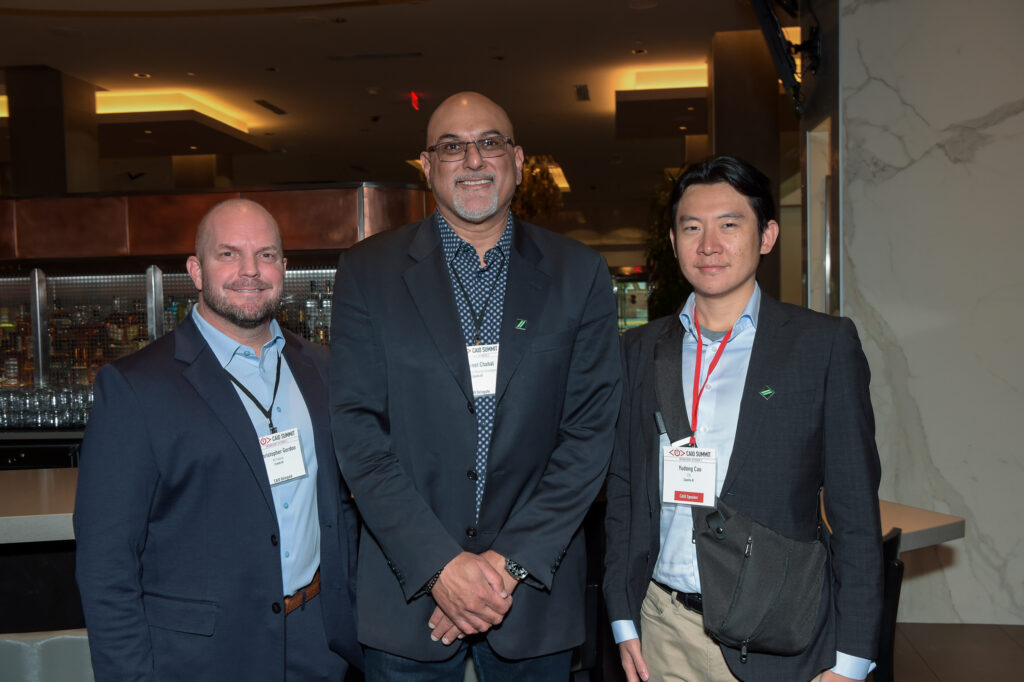 |
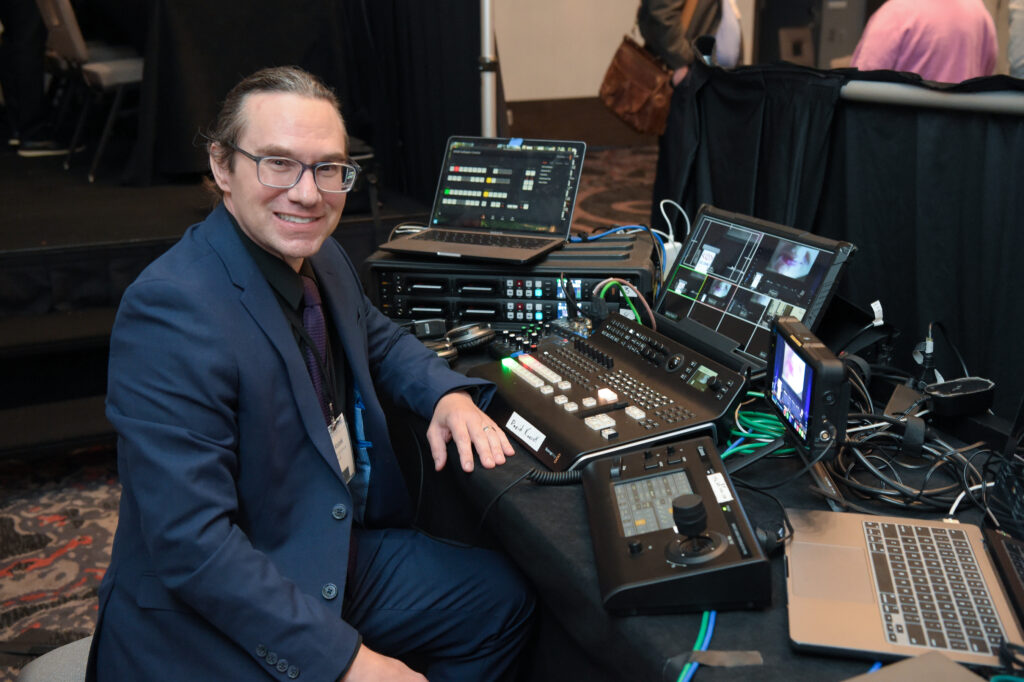 |
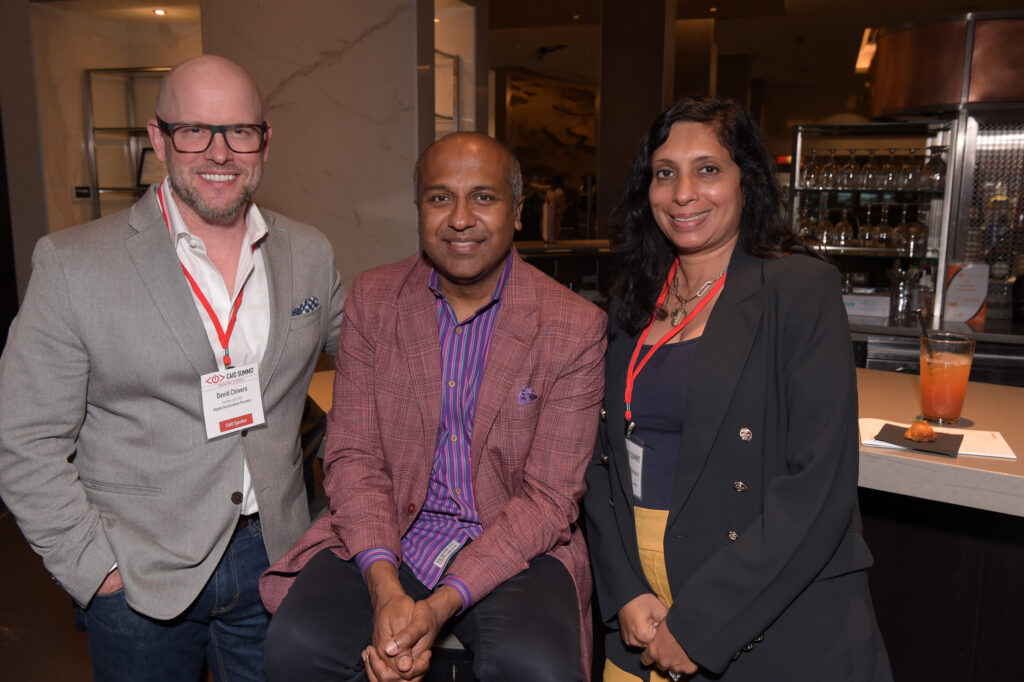 |
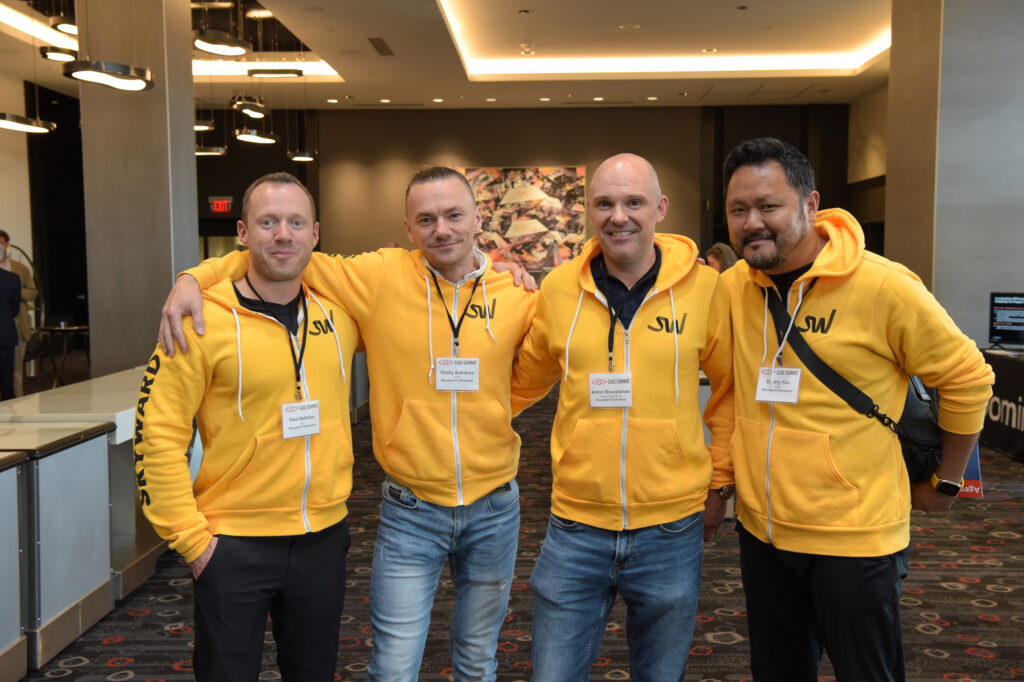 |
The next panel was on “Leveraging AI/Gen AI to Advance Government Innovation, Productivity, and Efficiency.”
Artificial intelligence is transforming the landscape of government operations, offering unprecedented opportunities for innovation, productivity, and efficiency.
This panel brought together key figures from federal agencies and industry to discuss strategies for successfully deploying generative AI across the enterprise.
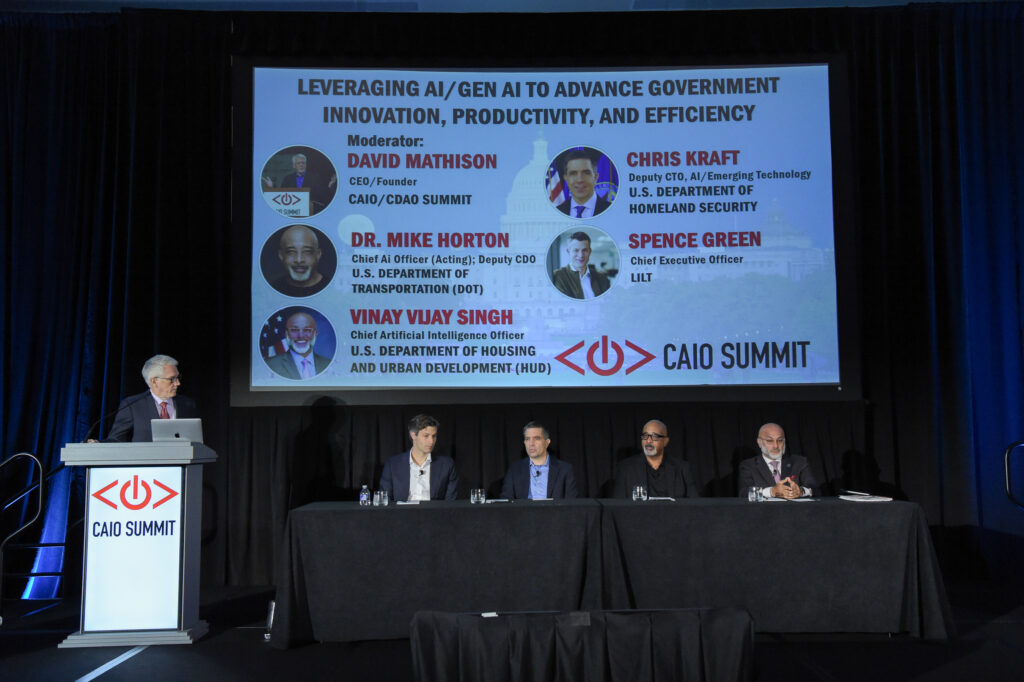 |
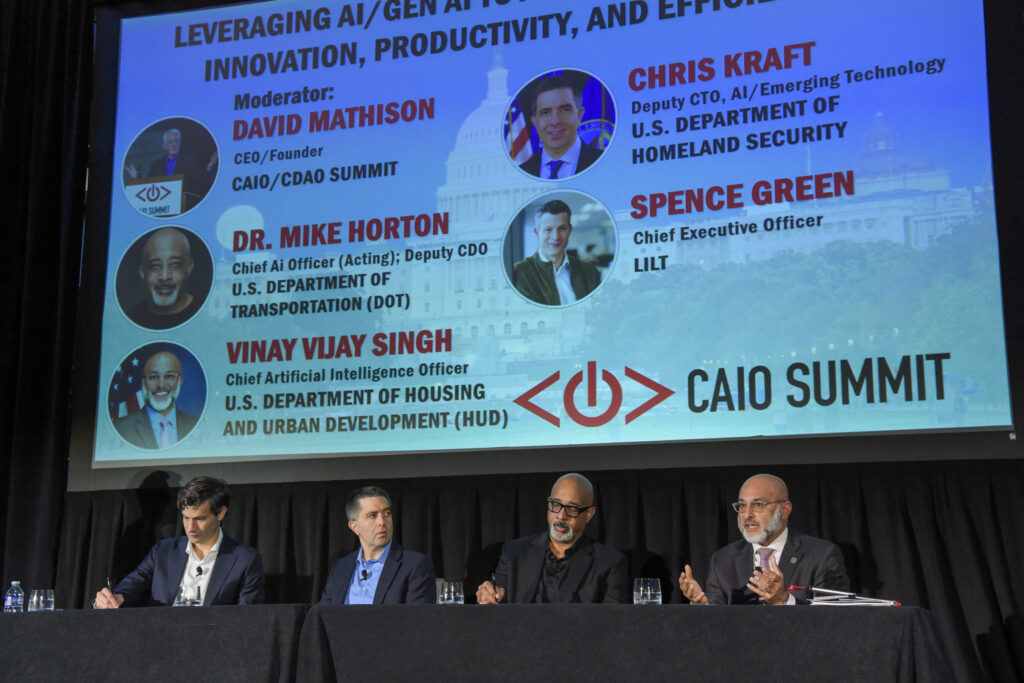 |
Participants explored best practices, challenges, and future directions for integrating AI into federal agencies, driving innovation, and delivering better outcomes for the public.
Panelists included:
- David Mathison: CEO, CDAO/CAIO Summit (moderator)
- Chris Kraft: Deputy CTO, AI/Emerging Technology, U.S. Department of Homeland Security
- Dr. Mike Horton: Chief Artificial Intelligence Officer (Acting); Deputy Chief Data Officer at U.S. Department of Transportation
- Spence Green: CEO of Lilt
- Vinay Vijay Singh: Chief AI Officer, U.S. Department of Housing and Urban Development
<VIDEO COMING SOON>
We are now planning our next events.
Contact us for more information: info at CDOClub.com
Thanks to all participants for asking such great questions and for being so engaged:
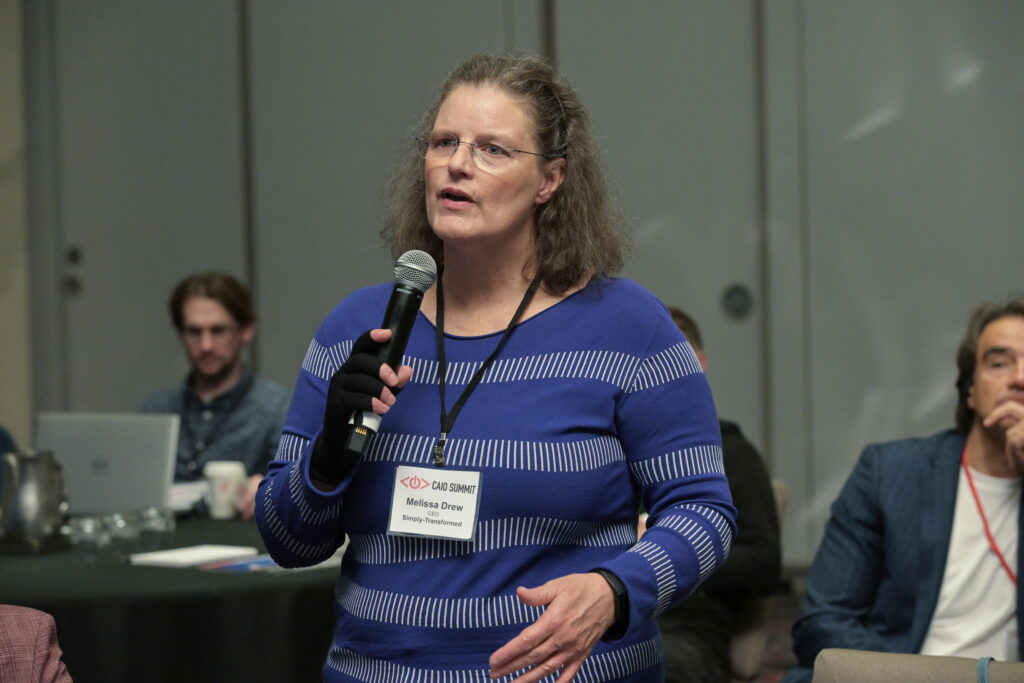 |
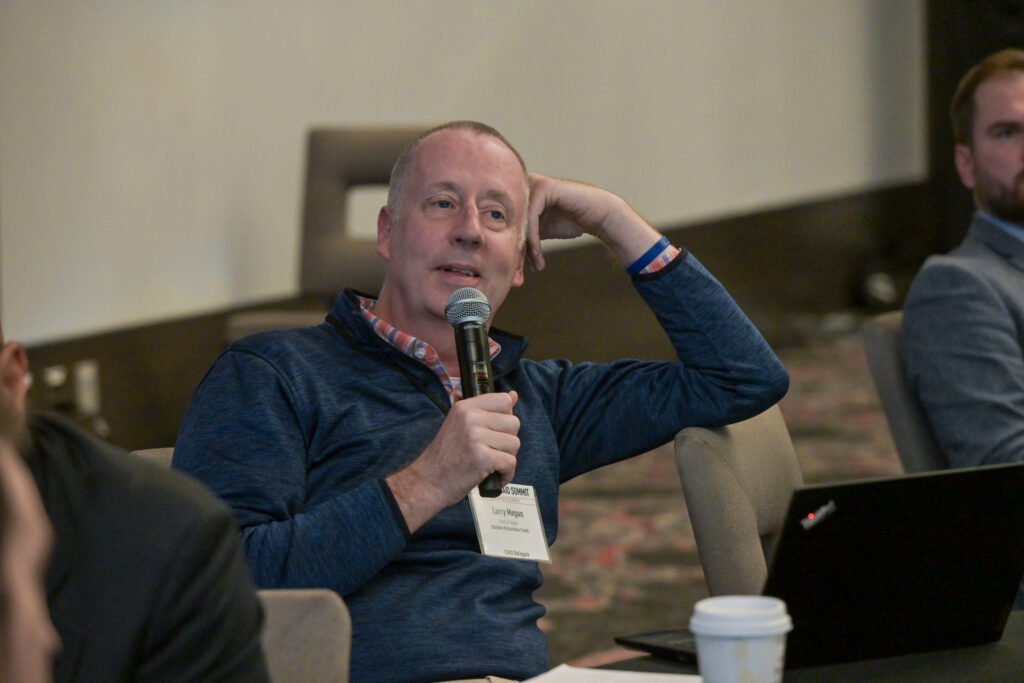 |
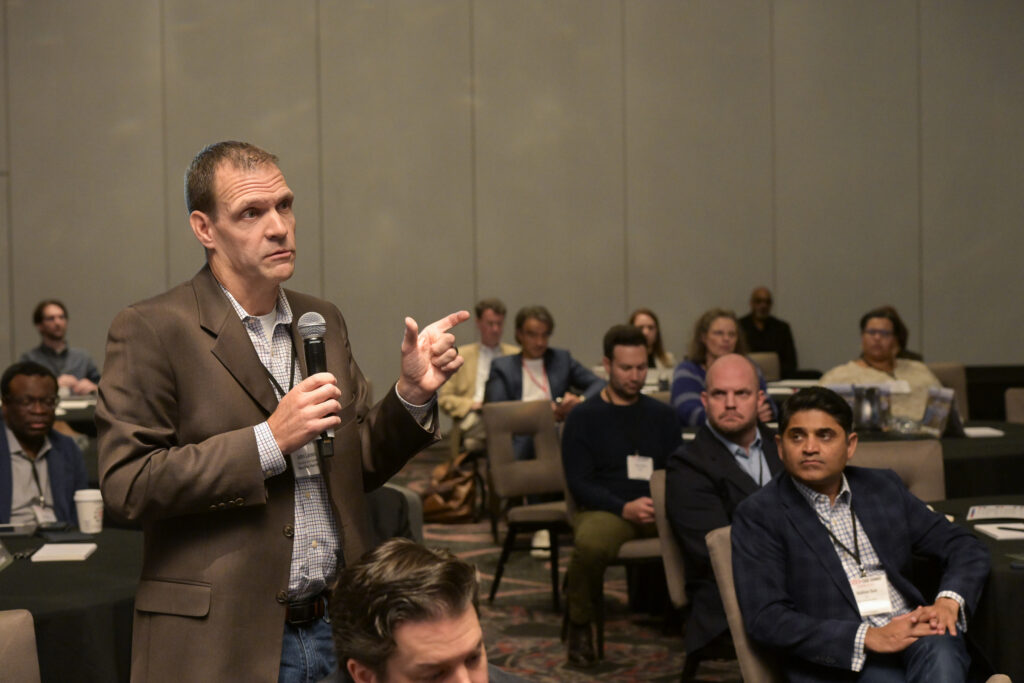 |
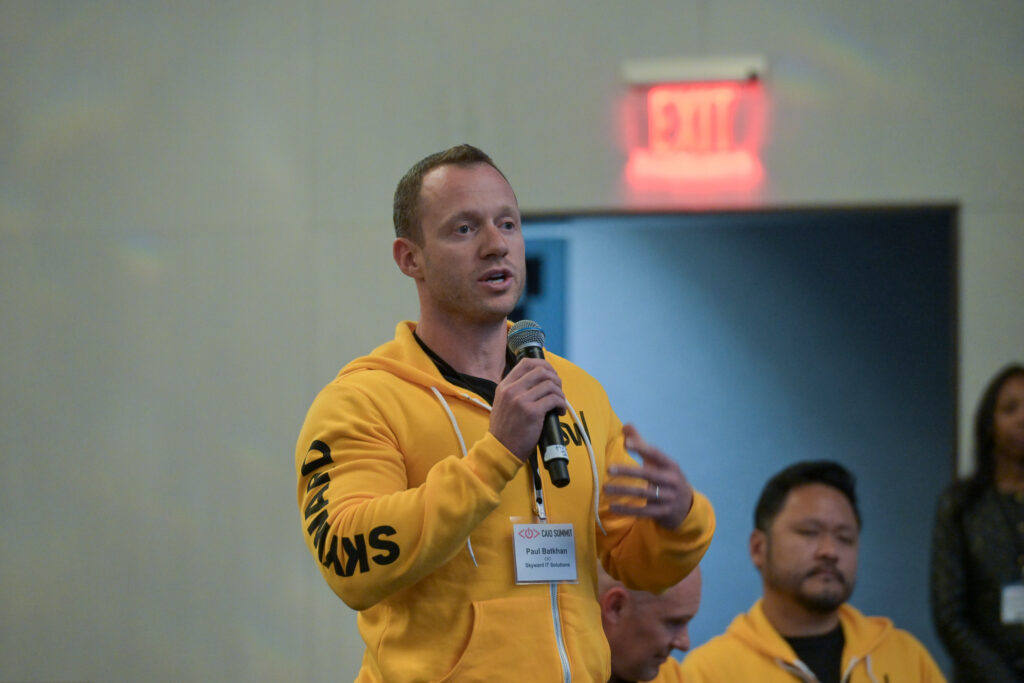 |
After lunch, delegates were treated to a keynote on “AI-First means People-first – Advice for Chief AI Officers” delivered by Florin Rotar, Chief AI Officer at Avanade.
Florin shared insights on his most important lesson from spearheading a global organization’s strategic AI transformation.
The real value of AI does not lie in technology. It begins with what truly matters: people.
He explored why the most successful CAIOs emphasize getting their organisations ready for AI. They work to turn doubt – for example that AI will replace jobs or is just a fad – into constructive trust. Only then can AI be adopted and scaled in a way that delivers meaningful impact.
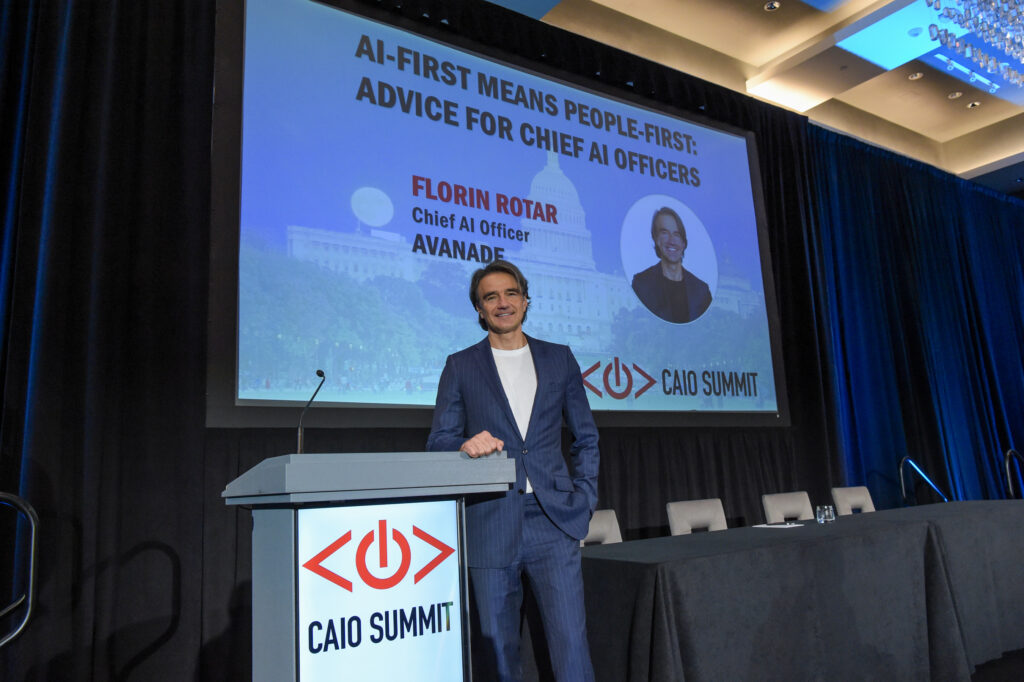 |
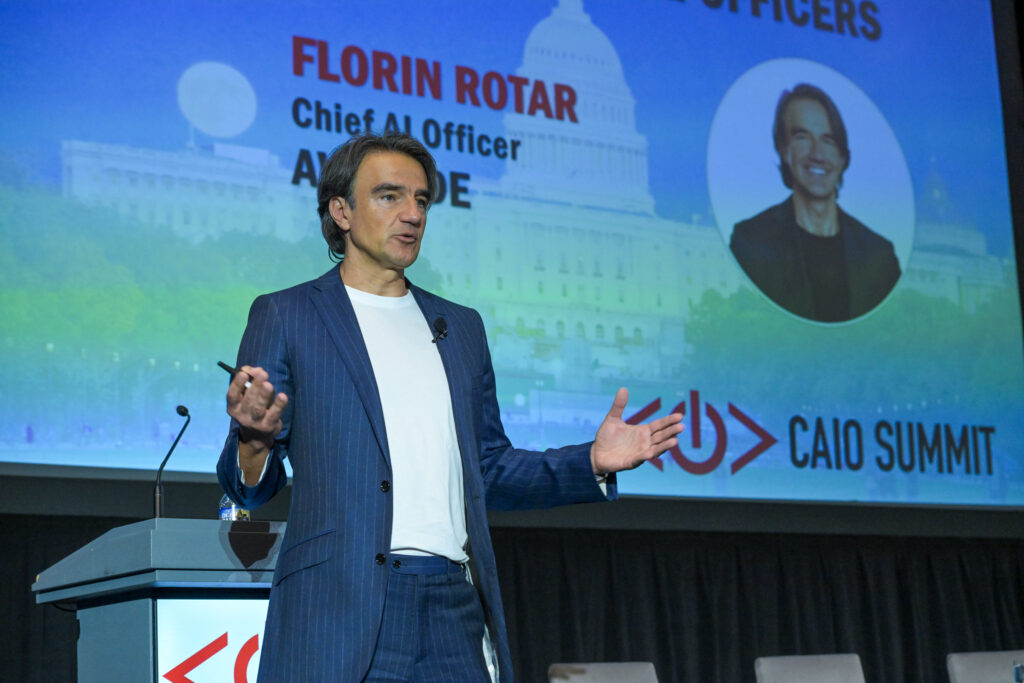 |
The keynote included Florin’s candid reflections on what he would advise his younger self from 2-3 years ago and how these insights can help those who are beginning or expanding their AI efforts.
His session included three key takeaways:
• Top 10 lessons on AI organizational readiness, adoption and value generation
• The “dos and don’ts” to be successful as a Chief AI Officer
• What priorities to get right – and the common mistakes to avoid
<VIDEO COMING SOON>
We are now planning our next events.
Contact us for more information: info at CDOClub.com
Delegates then took a break for lunch and networking with colleagues, speakers, and peers.
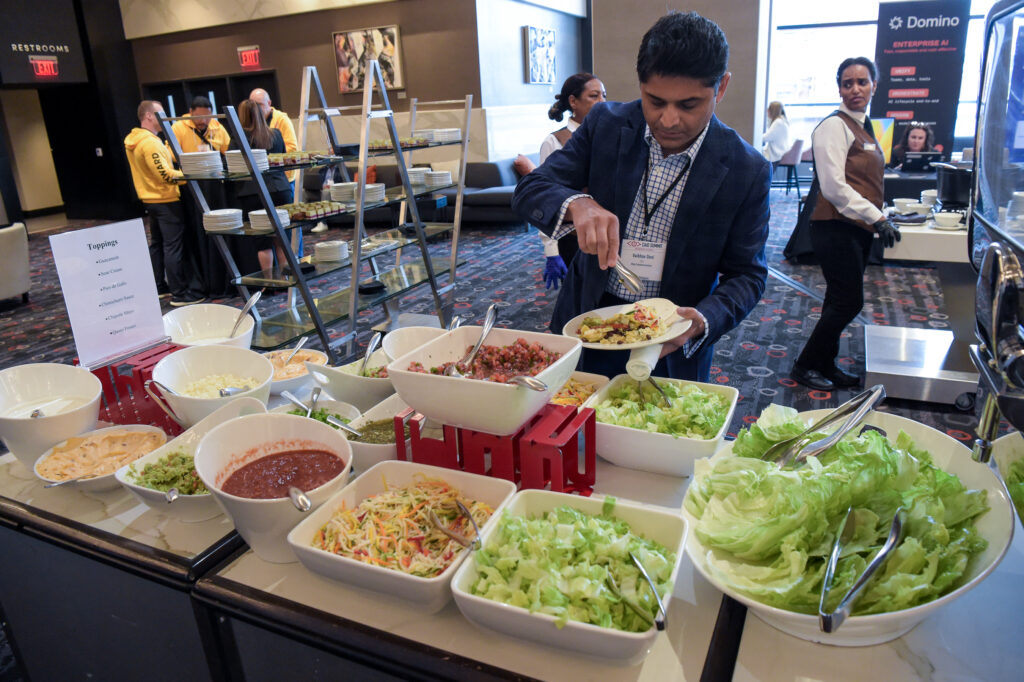 |
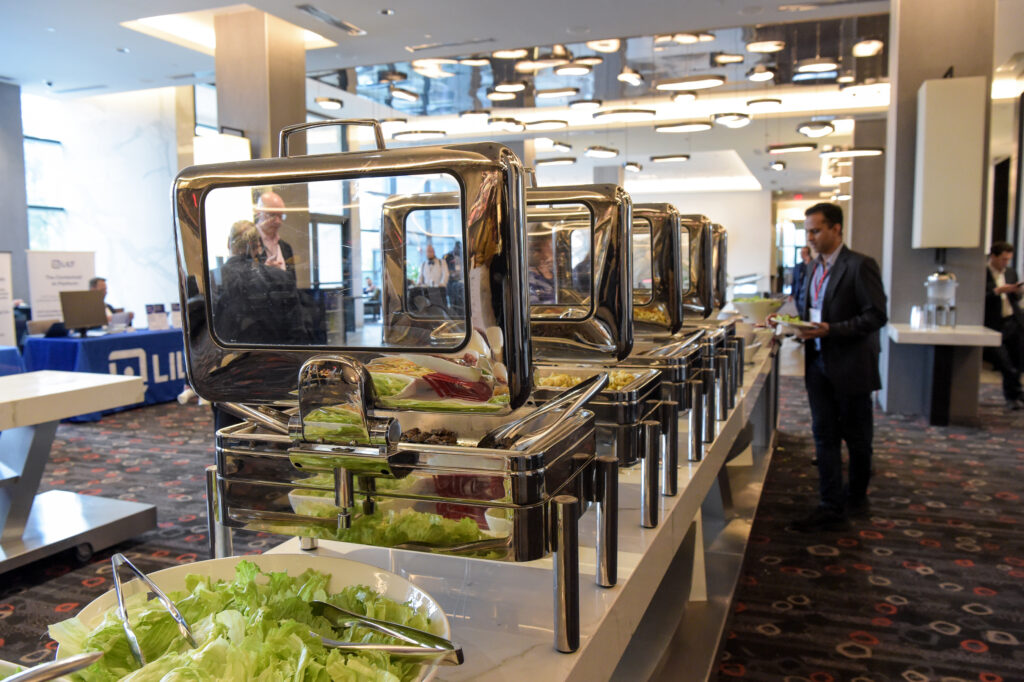 |
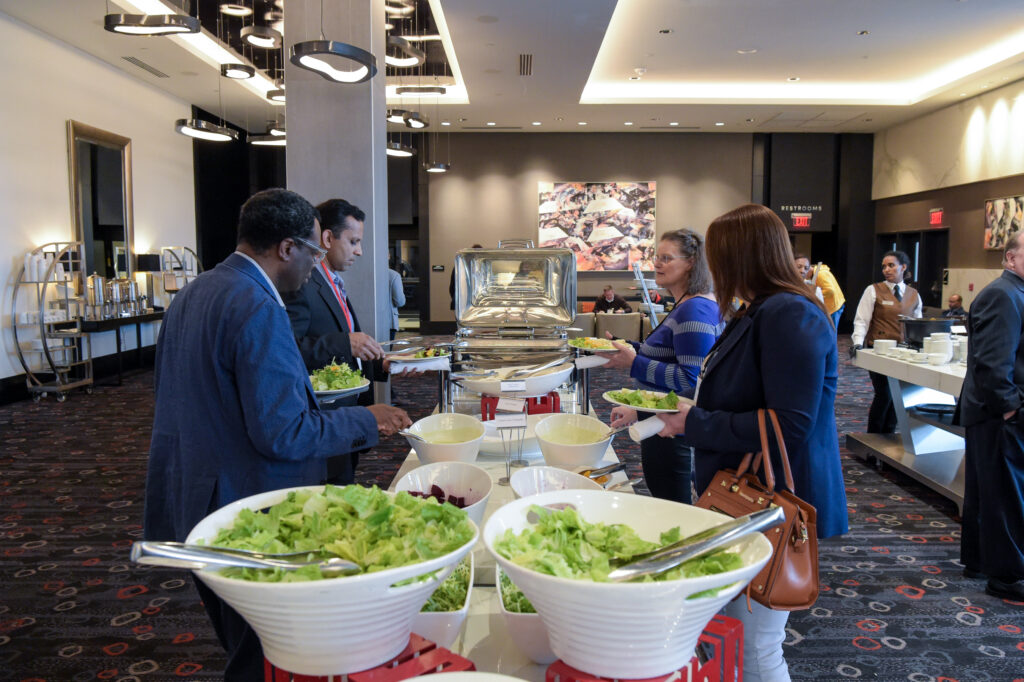 |
 |
The first keynote after lunch covered “AI Observability: The Key to Unlocking the Full Potential of Large Language Models” was presented by Danny Brock, VP of Customer Success at Fiddler AI.
Large language models (LLMs) are transforming business operations and decision-making.
However, deploying these models in organizations presents significant trust, reliability, and ethical challenges.
This keynote explored how AI observability ensures the performance, reliability, and transparency of LLMs, providing essential monitoring, diagnostics, and interpretability.
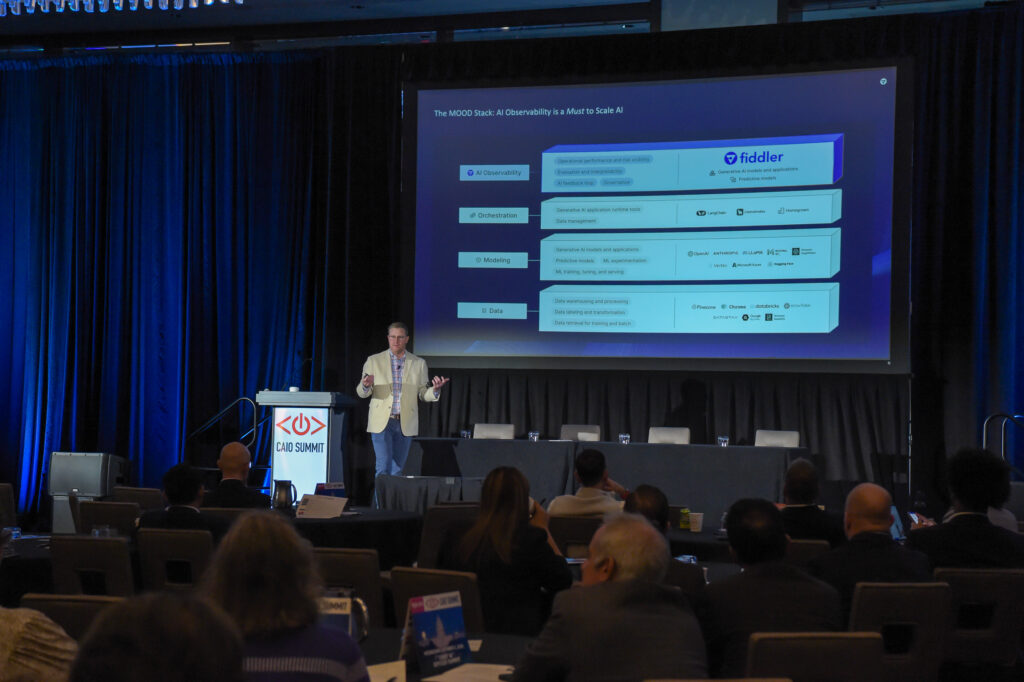 |
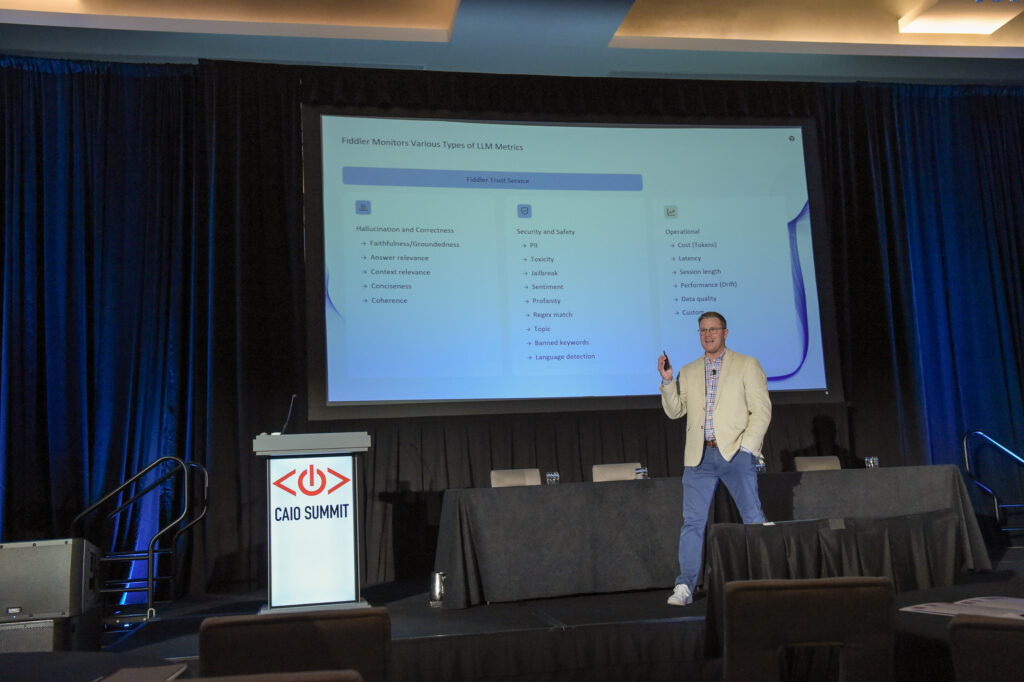 |
Through real-world case studies and industry best practices, Danny exposed the risks and challenges in deploying LLMs and generative AI.
Find out more at Fiddler AI.
<VIDEO COMING SOON>
We are now planning our next events.
Contact us for more information: info at CDOClub.com
The next panel was on “Securing Federal AI Talent: Strategies to Drive Innovation, Enhance Cybersecurity, and Ensure National Competitiveness.”
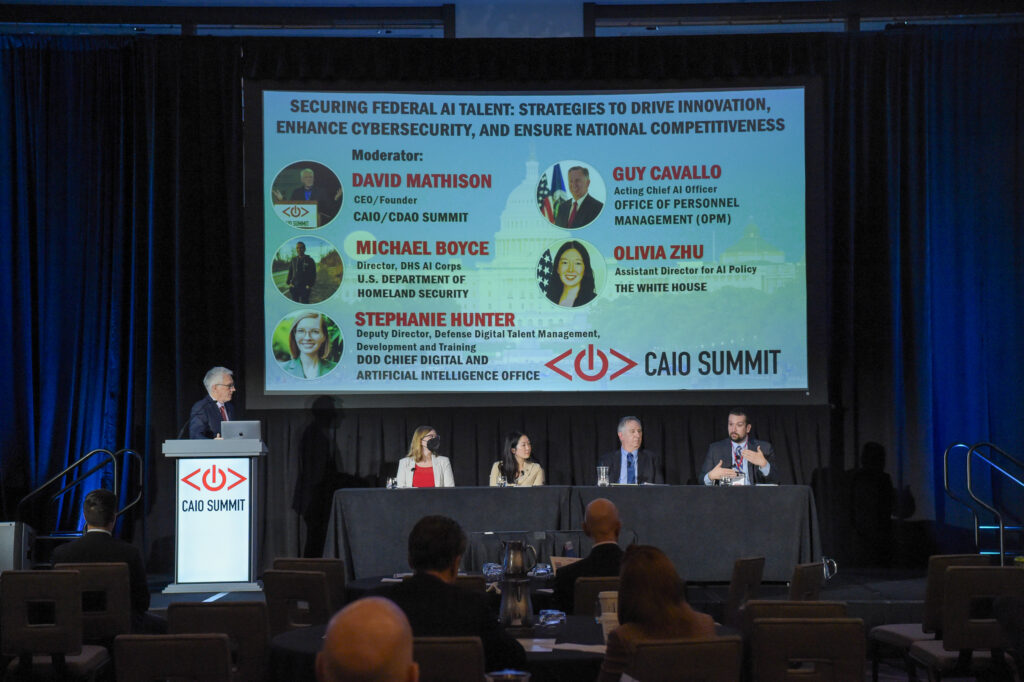 |
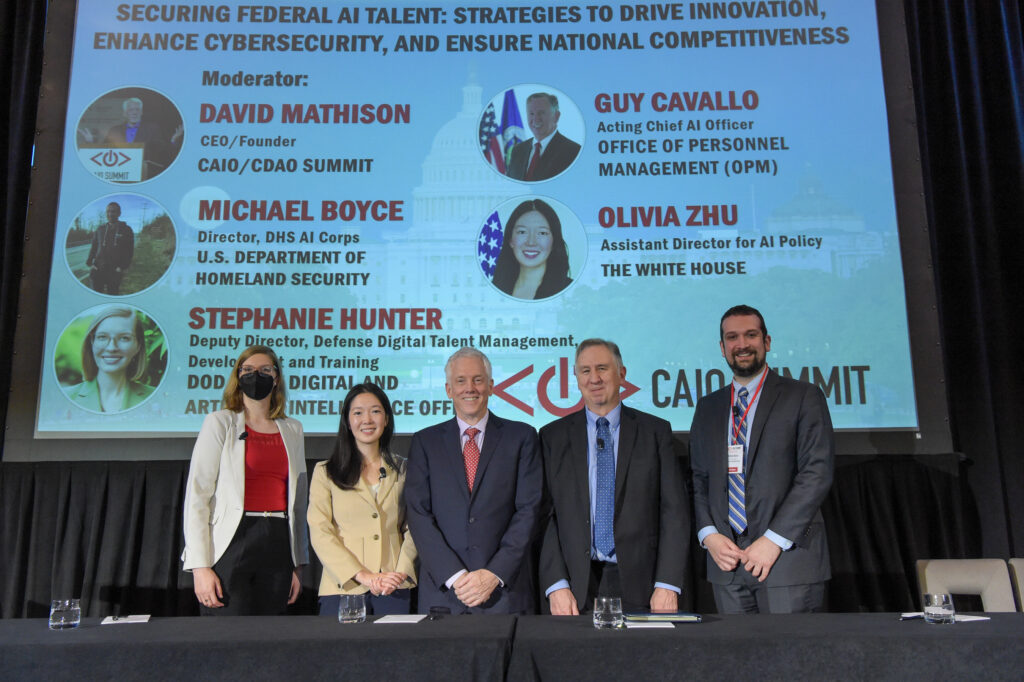 |
This critical conversation brought together distinguished leaders driving AI talent acquisition and strategy across federal agencies, including:
- Guy Cavallo: CIO and Acting Chief AI Officer, Office of Personnel Management (OPM):
Guy highlighted recent policy and administrative actions designed to enhance the federal government’s ability to attract and retain top AI talent. He detailed ongoing efforts to modernize hiring practices, streamline talent acquisition processes, and foster a culture that supports digital transformation. - Michael Boyce: Director, DHS AI Corps, U.S. Department of Homeland Security (DHS):
Michael shared the progress of the DHS AI Corps, emphasizing the need for specialized AI teams to address national security challenges. He provided insights into the recruitment and development of mission-critical AI talent and the pivotal role these teams play in securing the nation’s technological edge. - Olivia Zhu: Assistant Director for AI Policy, The White House:
Olivia explored the role of the executive branch in setting AI talent policies including the Biden-Harris Executive Order on AI, and fostering a culture of innovation within federal agencies. She underscored the importance of cross-agency collaboration and outlined key initiatives to promote AI talent development and ethical AI integration at the federal level. - Stephanie Hunter: Deputy Director, Defense Digital Talent Management, Development and Training, DoD Chief Digital and Artificial Intelligence Office (CDAO):
Stephanie discussed the Department of Defense’s efforts to integrate AI expertise into defense operations. She highlighted innovative programs aimed at identifying and nurturing AI talent for defense applications, while addressing the challenges of recruiting and retaining technical leaders in a competitive job market.
WATCH THE FULL KEYNOTE VIDEO BELOW:
Key Takeaways:
- Policy Support: Federal agencies are implementing modern hiring frameworks to overcome traditional barriers and attract world-class AI talent.
- Specialized AI Teams: Initiatives like the DHS AI Corps are essential to building mission-driven AI capabilities for national security.
- Cross-Agency Collaboration: Collaboration between federal agencies and the executive branch is key to creating cohesive AI talent strategies.
- Defense Integration: The DoD is leading efforts to embed AI expertise into critical defense operations, ensuring the U.S. remains competitive on the global stage.
This panel underscored the urgent need for innovative strategies to secure federal AI talent, emphasizing its critical role in driving innovation, enhancing cybersecurity, and maintaining national security.
Delegates then took one final break to network with colleagues and peers.
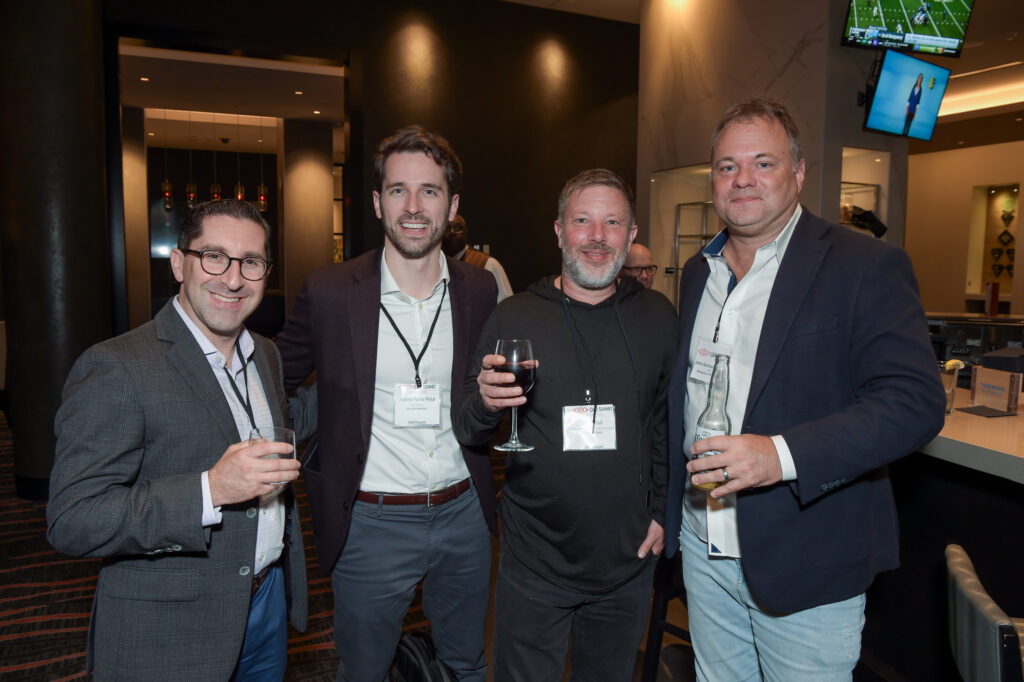 |
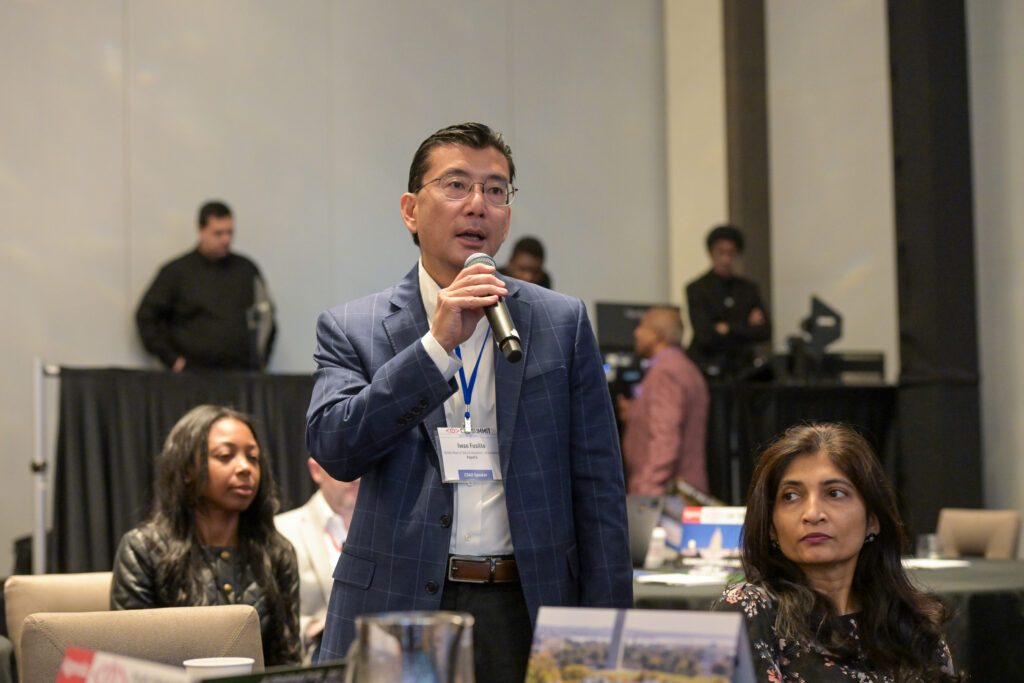 |
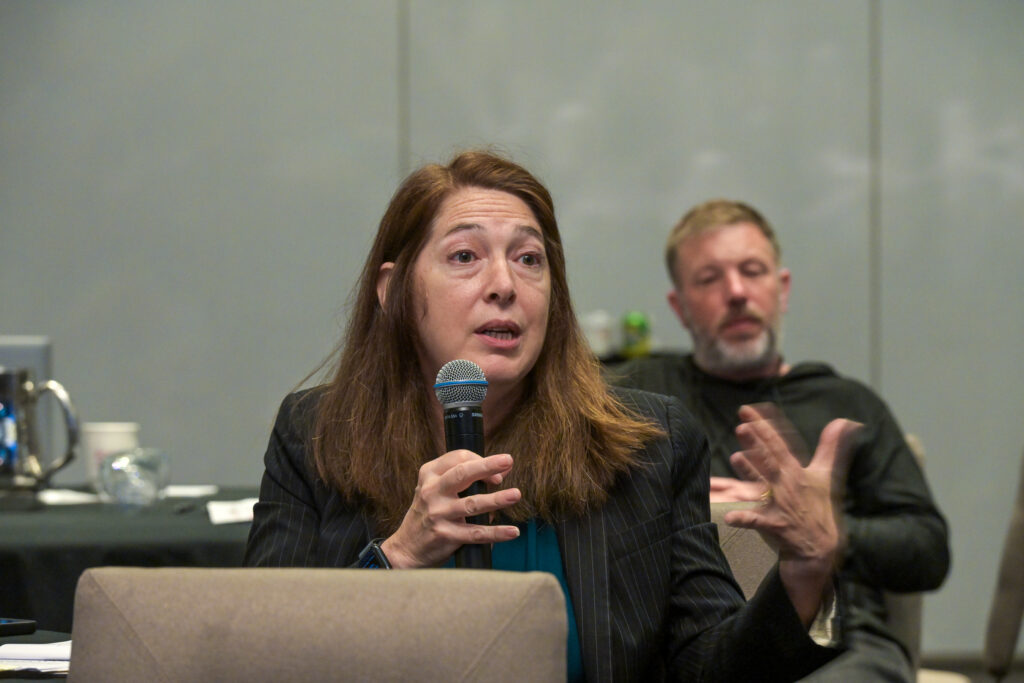 |
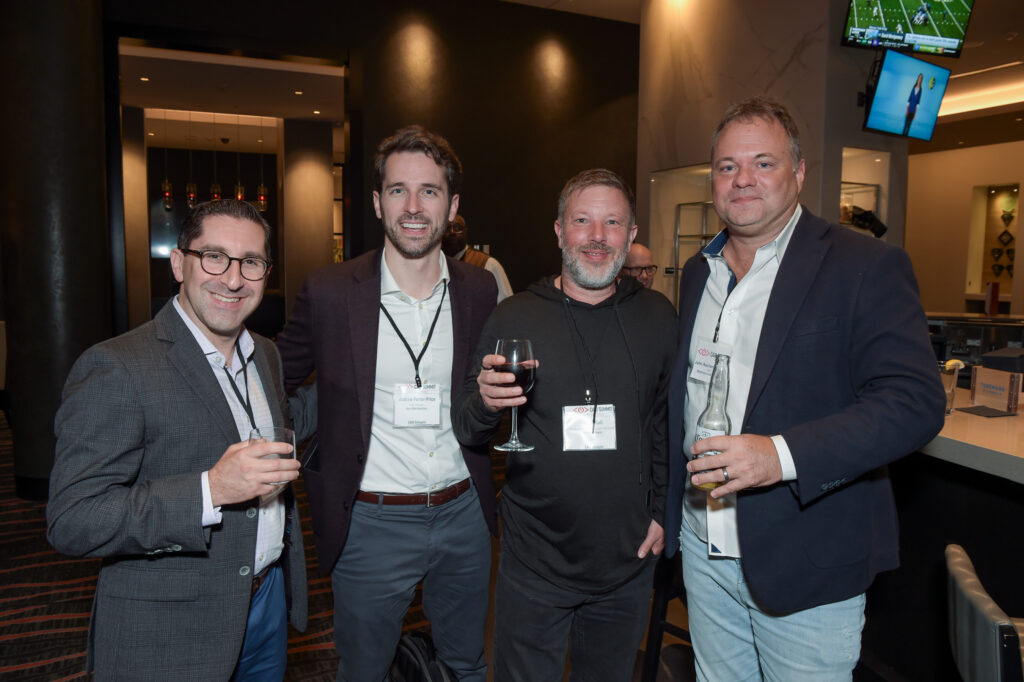 |
After the break we held the final panel on “On-Demand AI Leadership: Delivering Scalable and Agile AI Strategy, Innovation, Productivity, and Competitive Advantage – Without the Full-Time Commitment or Cost.”
AI capabilities are pivotal to organizational success, but demand has far outstripped supply for C-level AI talent, leaving most small and medium businesses unable to afford the expense of a full-time Chief AI Officer.
This panel brought together distinguished leaders to discuss the advantages of leveraging the fractional model for CDAOs and CAIOs (aka “Talent as a Service”).
Panelists explored the benefits of this approach, how it can rapidly deliver AI/data strategy, amplify existing teams at lower cost, drive innovation, enhance operational efficiency and productivity, and provide scalable, strategic, top-tier AI talent and leadership without the long-term expense and commitment of a full-time executive.
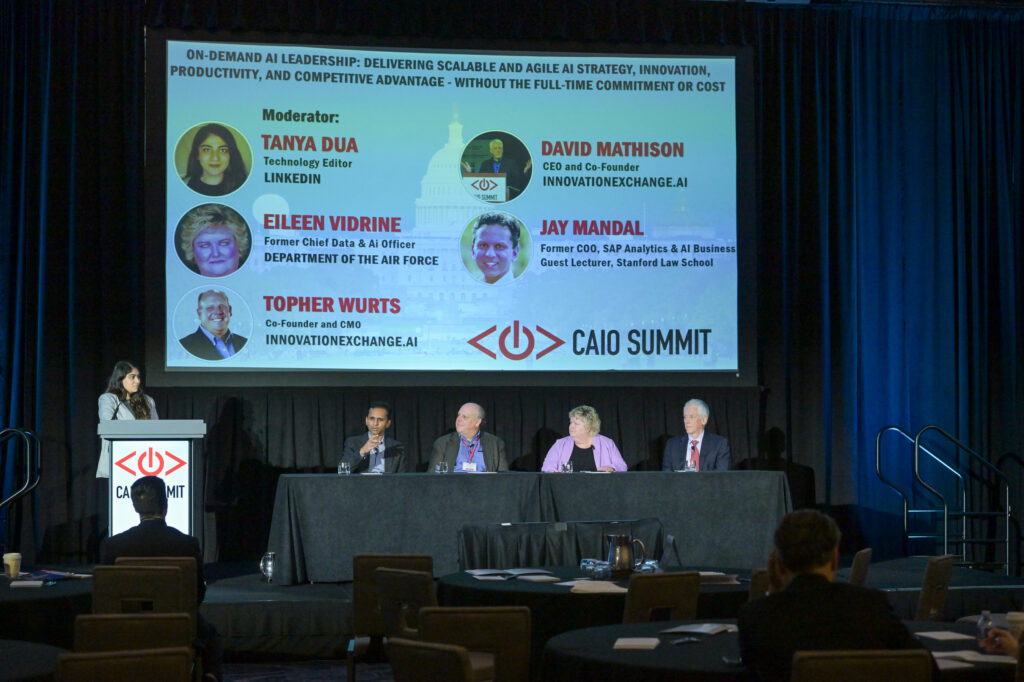 |
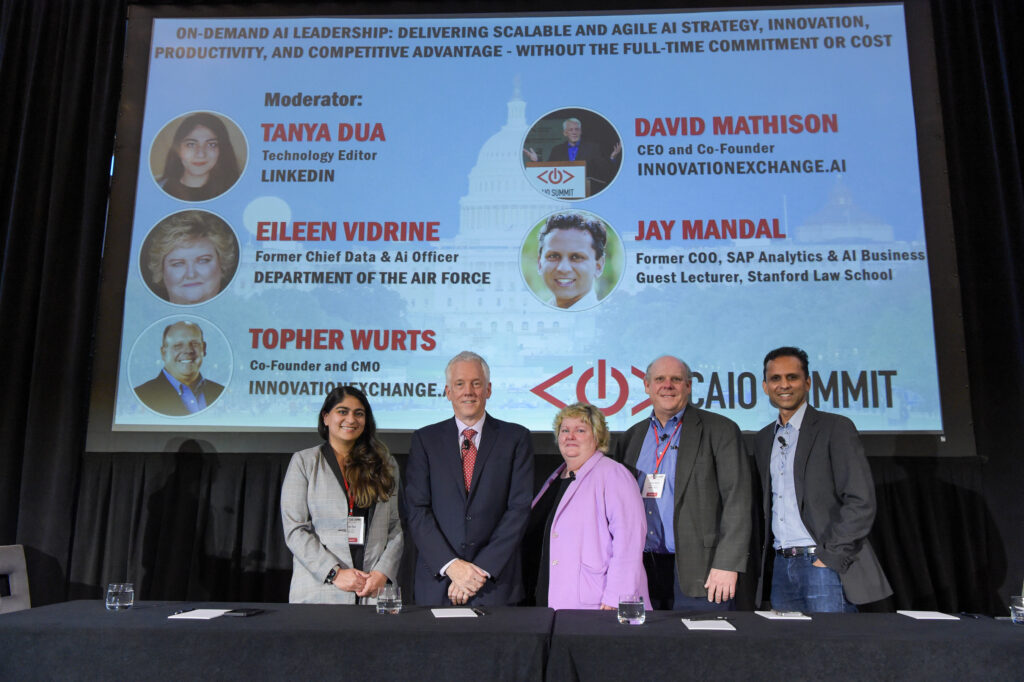 |
Participants included:
- Tanya Dua: Technology Editor, LinkedIn (moderator)
- David Mathison: CEO, InnovationExchange.ai
- Eileen Vidrine: Former Chief Data & Artificial Intelligence Officer, US Department of the Air Force
- Jay Mandal: Former COO, SAP Analytics & AI Business and Guest Lecturer, Stanford Law School
- Topher Wurts: Co-Founder, InnovationExchange.ai
<VIDEO COMING SOON>
We are now planning our next events.
Contact us for more information: info at CDOClub.com
Thanks to all participants for asking such great questions and being so engaged:
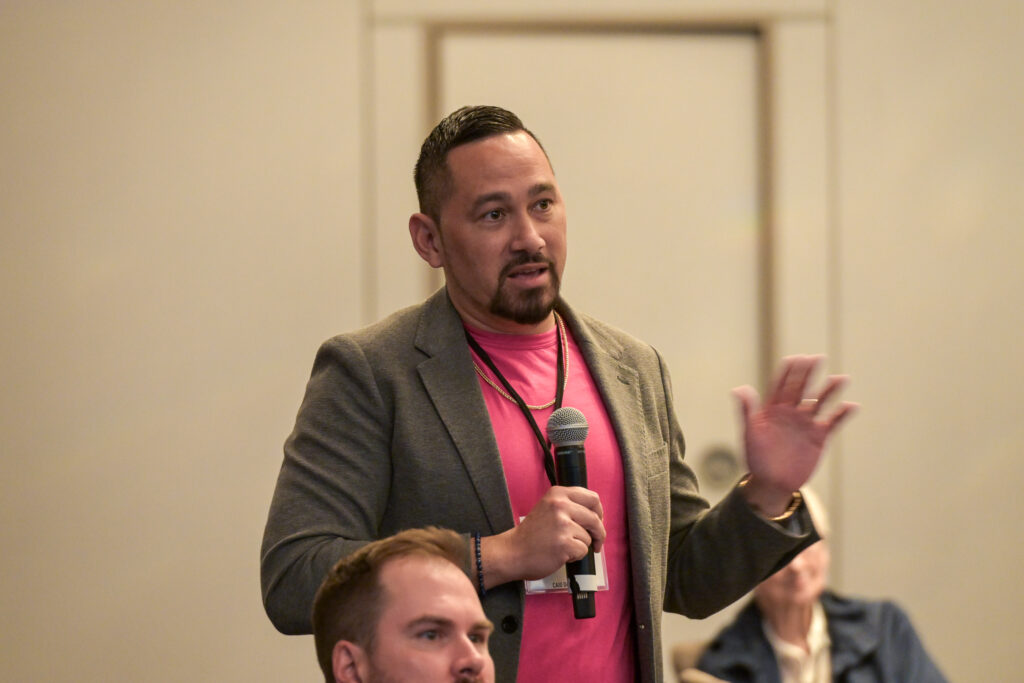 |
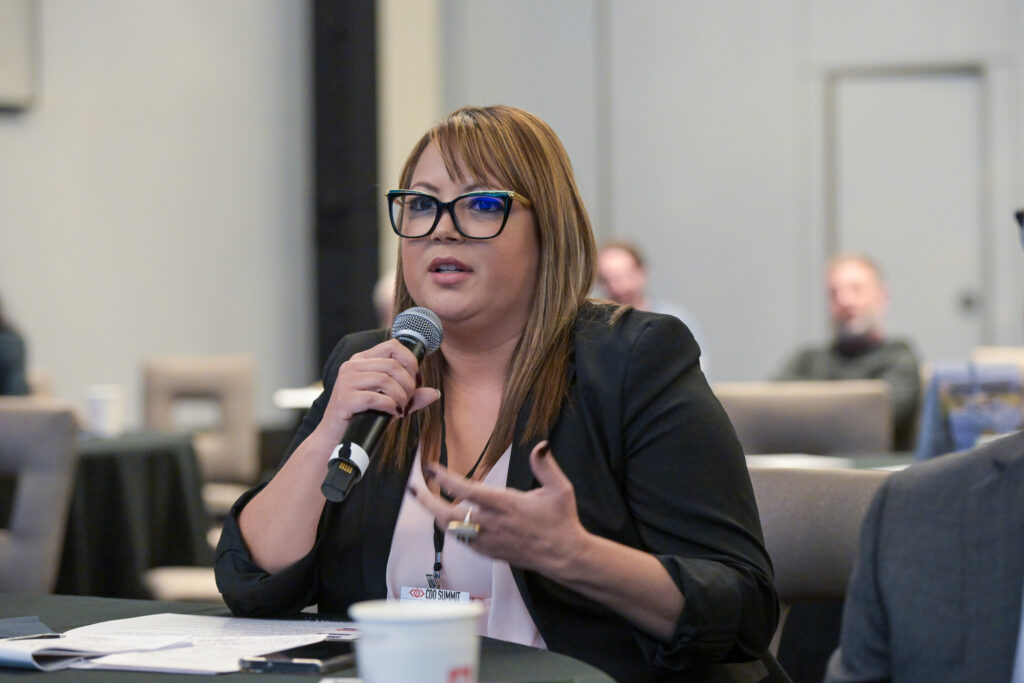 |
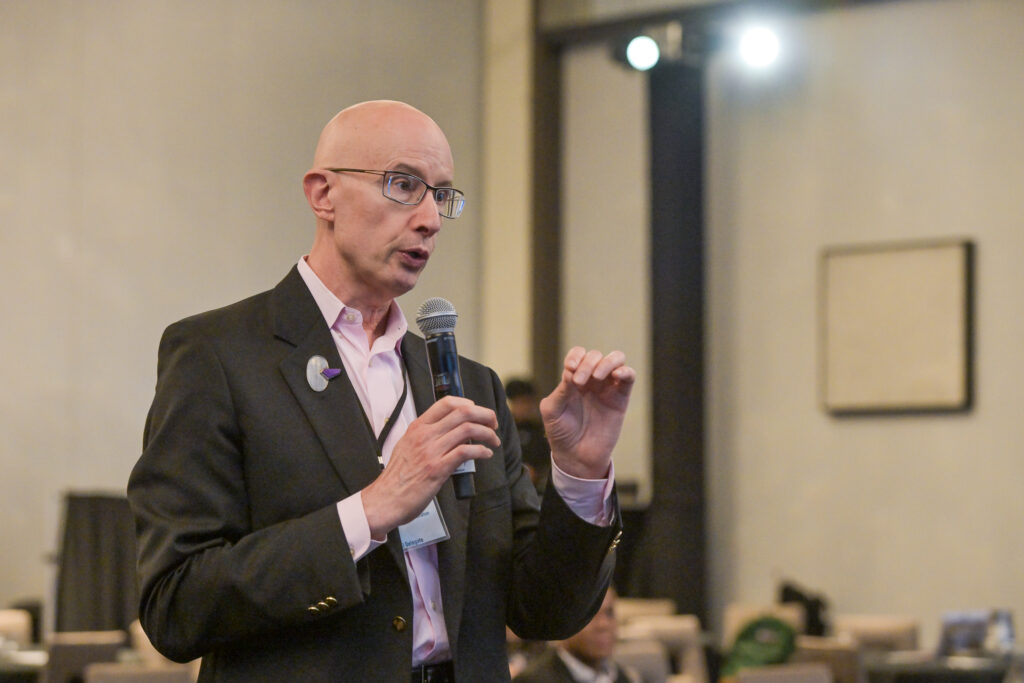 |
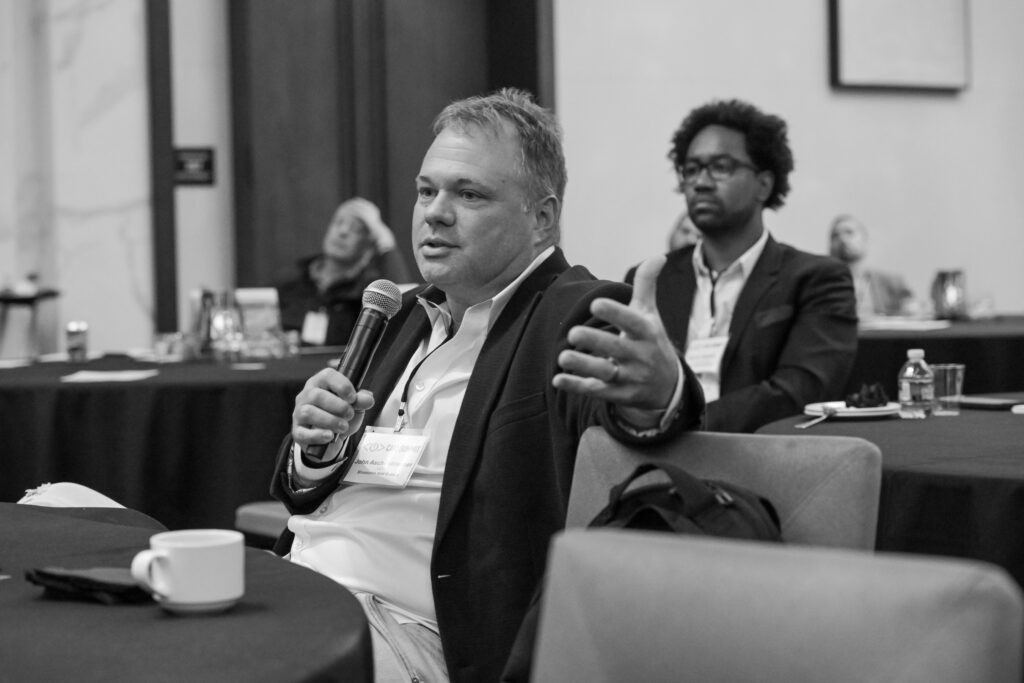 |
Sree Sreenivasan and David Mathison then took questions and wrapped up.
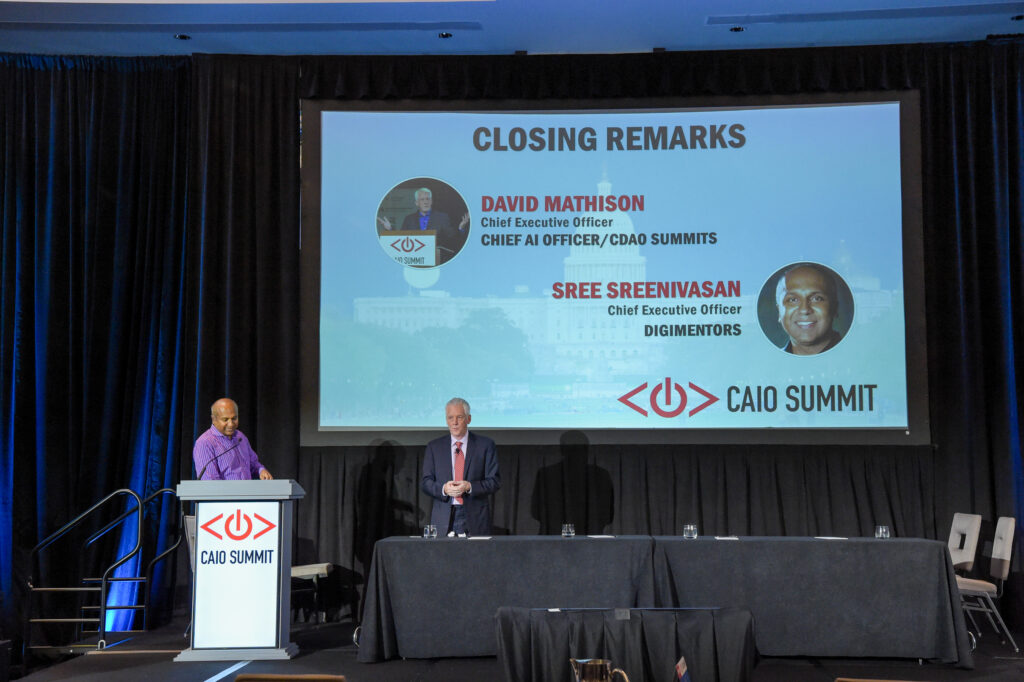 |
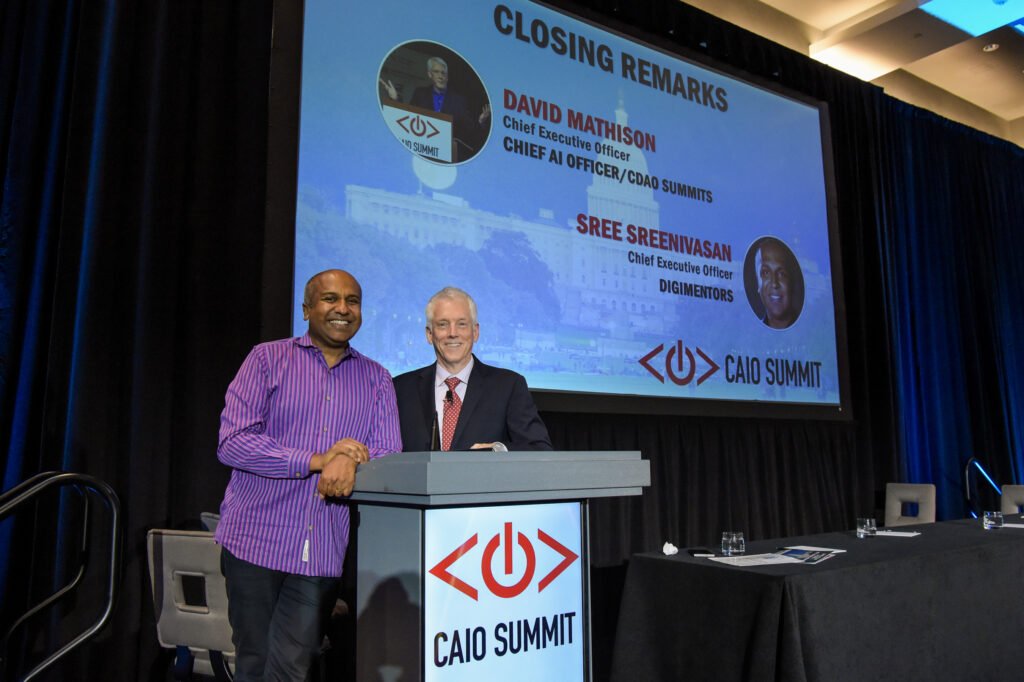 |
Thank you to everyone for making this event a success, including all delegates, speakers, and participants. I hope you enjoyed the reception:
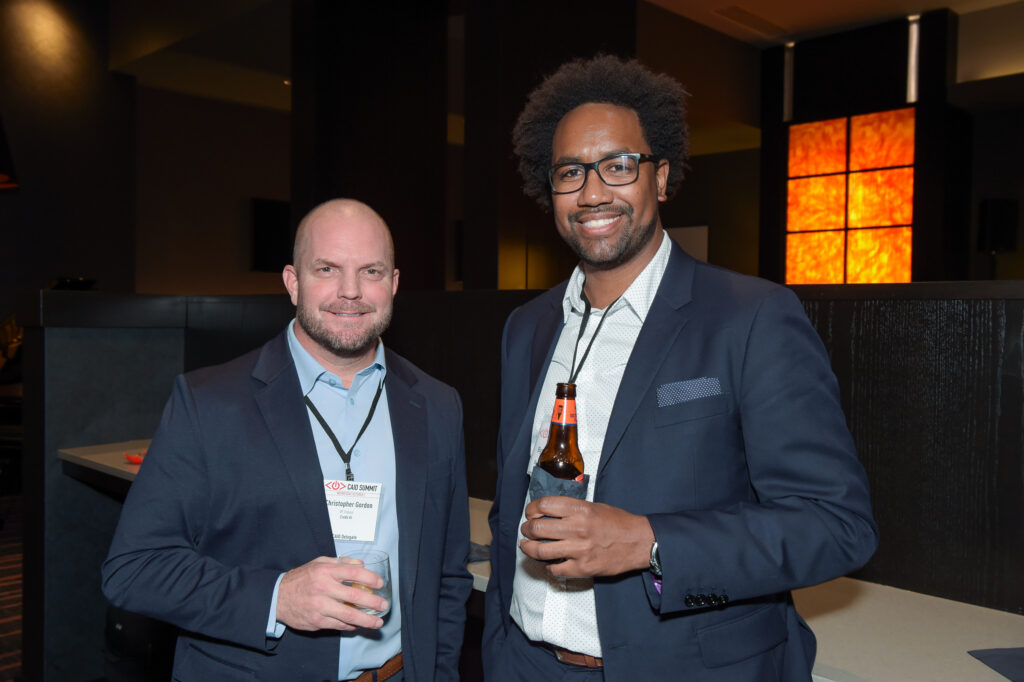 |
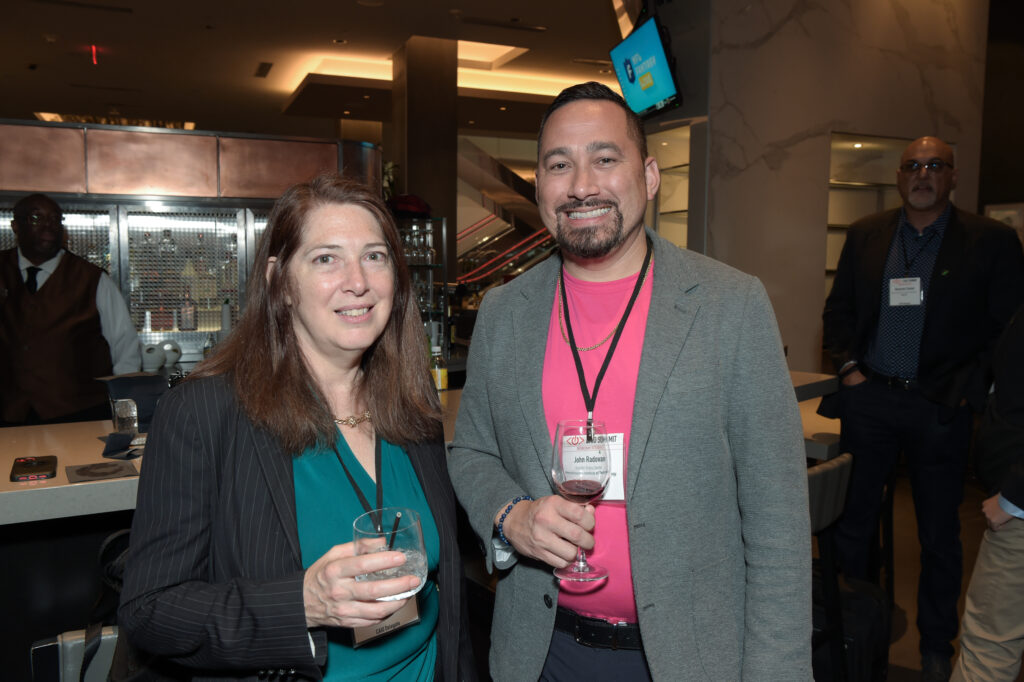 |
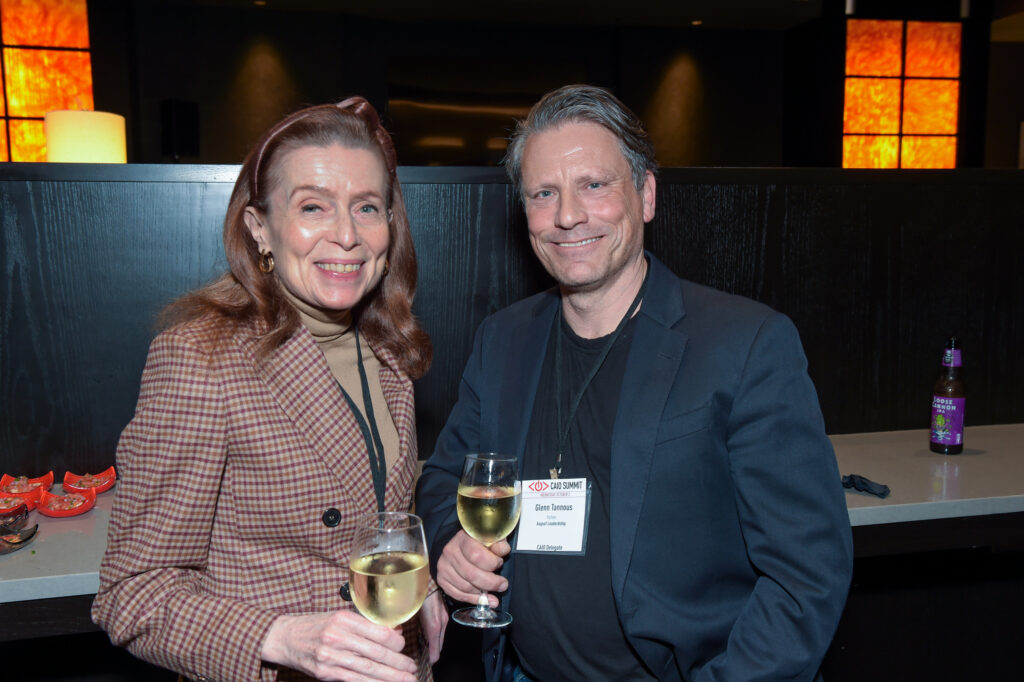 |
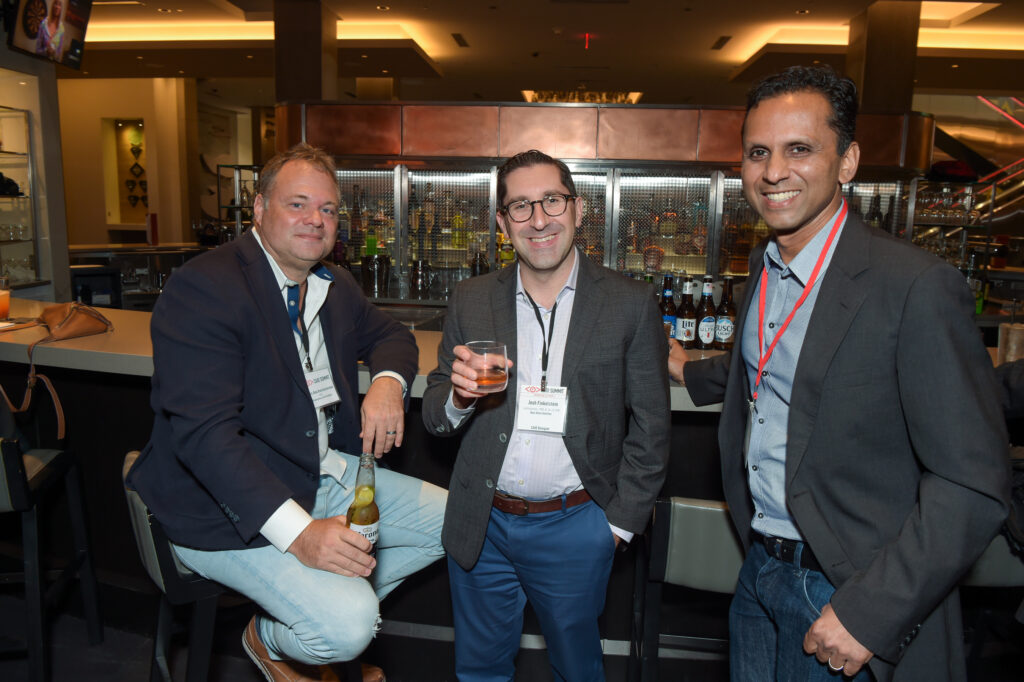 |
Thanks to our sponsors Domino Data Lab, Fiddler AI, Lilt, CDO Club, Zapata AI!
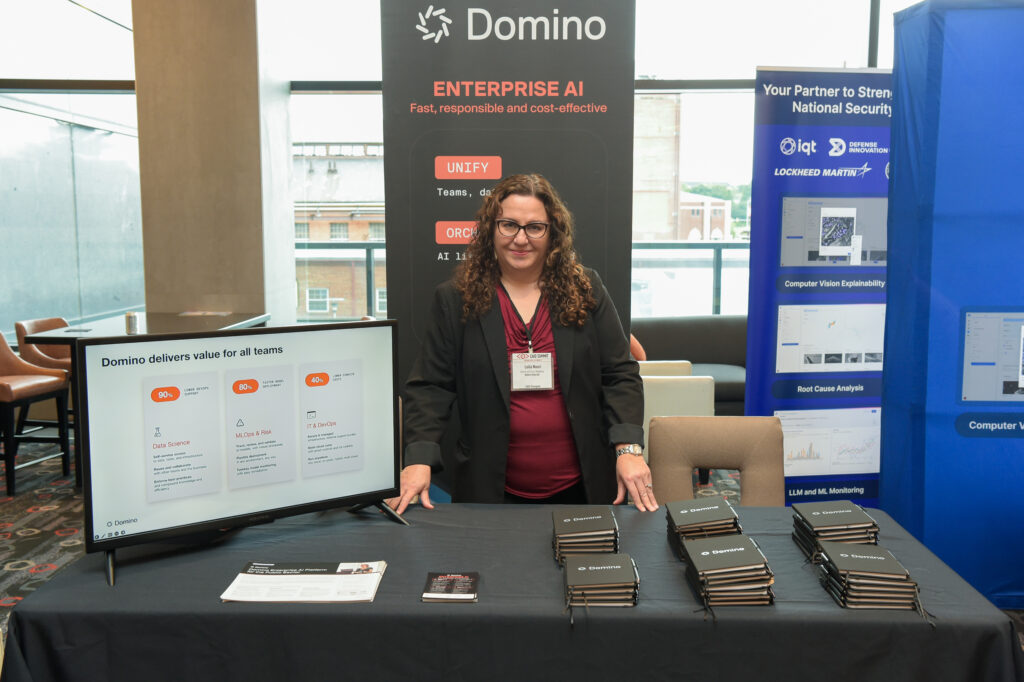 |
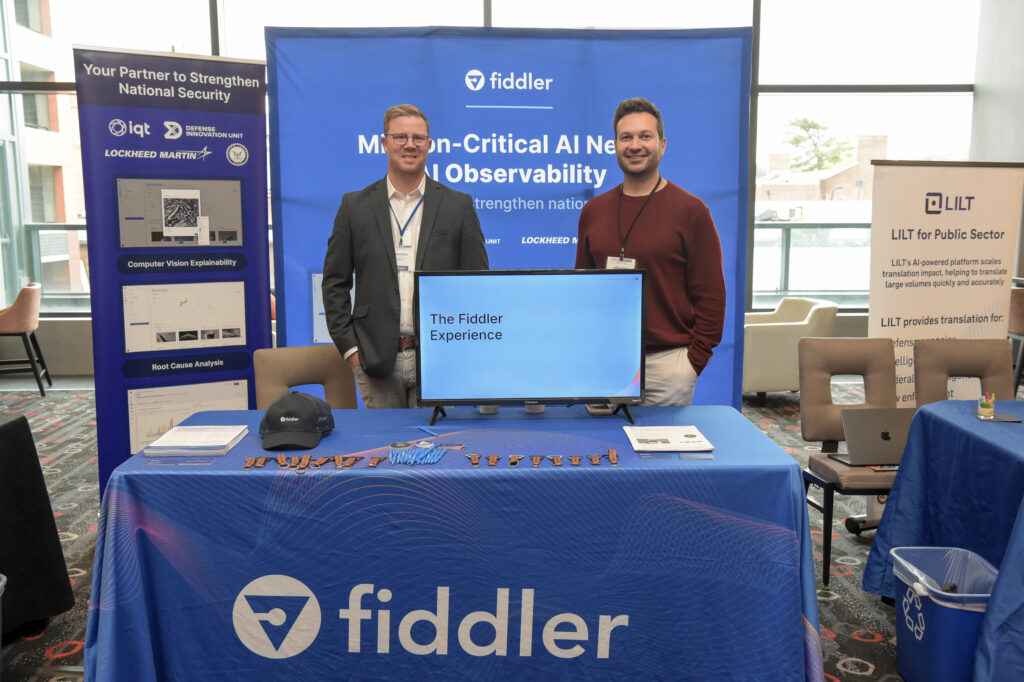 |
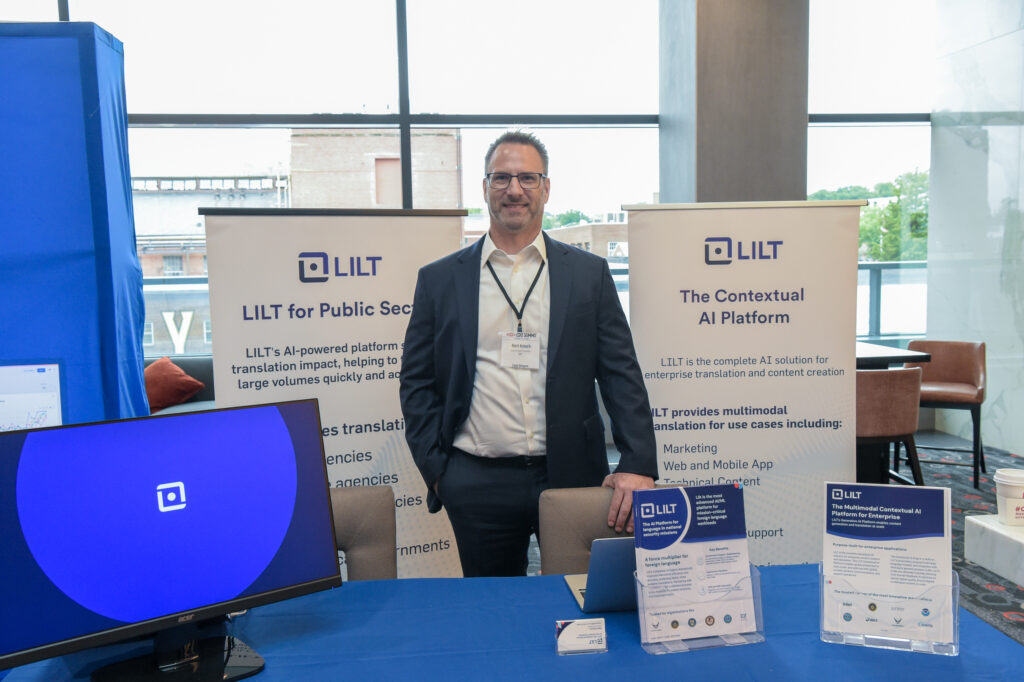 |
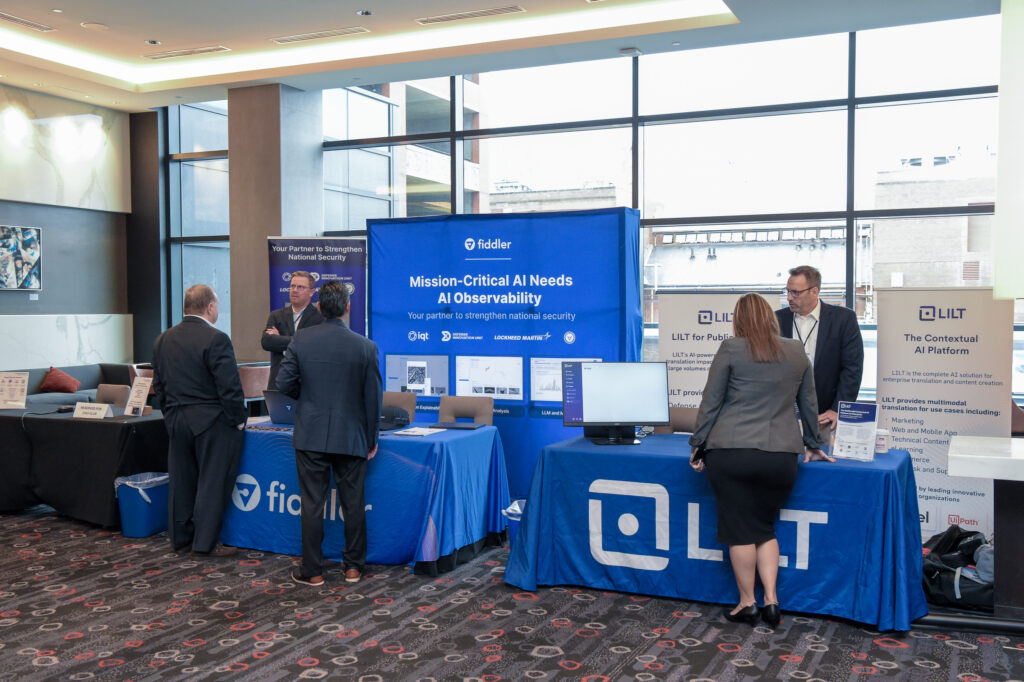 |
SEE YOU NEXT TIME!
To see all photos from this event click here.
All Photos by David Lubarsky Photography: https://www.davidlubarsky.com
<VIDEO COMING SOON>
We are now planning our next events.
Contact us for more information: info at CDOClub.com


